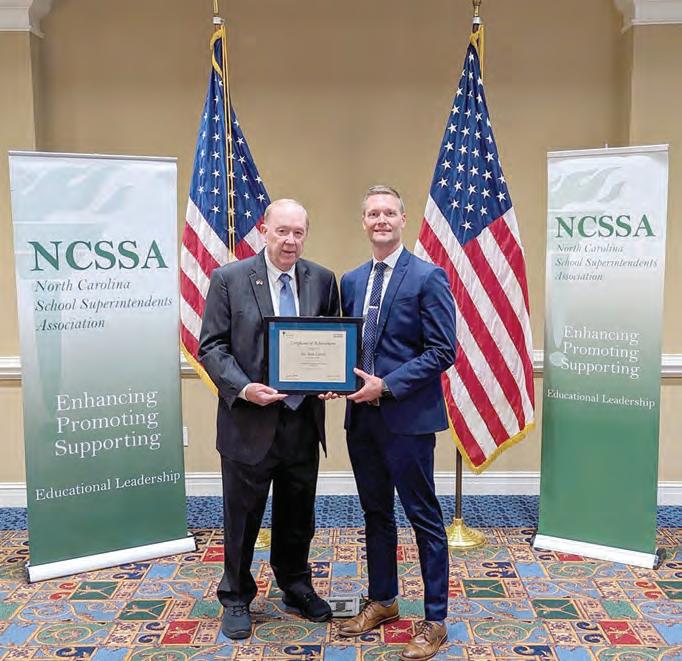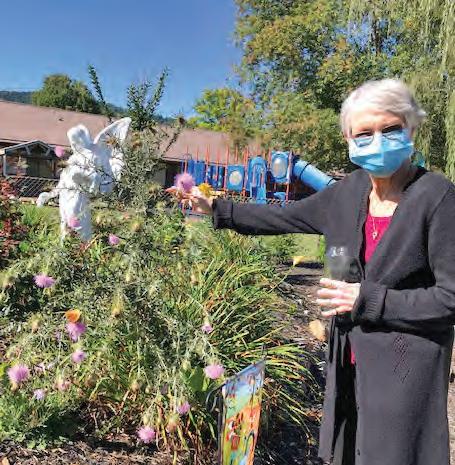NOW HIRING: INSIDE





On the Cover:
May 24 marks the last time the iconic steam whistle at Canton’s paper mill will sound over the town — at least from its current location. As reality sets in for folks in Haywood County and beyond, questions still linger regarding many unknowns, from how the environment beyond the Pigeon River may be affected to how former employees will ensure health coverage after their current insurance expires. A mural in Canton depicts the paper mill. Max Cooper photo
News
Now, Pactiv Evergreen wants a tax break....................................................................4 Waynesville will consider establishing a social district............................................5 Principal chief candidates debate the issues..............................................................6 Mill receives two air quality violation notices................................................................8 Pre-trial conference set for Bo Crowe assault case..................................................9
A health care coverage crisis is unfolding at Canton’s paper mill......................10 Lynch named superintendent of Macon County Schools....................................14 Education briefs..................................................................................................................15
Opinion
The U.S. just can’t really ‘budge it’..............................................................................16 Vietnam vets are now the old guys..............................................................................17
A&E
Six strings of soul: N.C. Guitar Celebration returns................................................18
Off-target: A Review of ‘The Bullet Garden’..............................................................25
Outdoors
Mill closure looms large in discussion of challenges facing WNC forests......26
ADVERTISING SALES: Susanna Shetley.
Amanda Bradley.
Sophia Burleigh.
C LASSIFIEDS: Scott Collier. .
N EWS E DITOR: Kyle Perrotti.
WRITING: Holly Kays.
Hannah McLeod.
Cory Vaillancourt.
Garret K. Woodward.
ACCOUNTING & O FFICE MANAGER: Amanda Singletary. .
. . stefanee@mtnsouthmedia.com
susanna.b@smokymountainnews.com
jc-ads@smokymountainnews.com

sophia.b@smokymountainnews.com
classads@smokymountainnews.com
garret@smokymountainnews.com
smnbooks@smokymountainnews.com
D ISTRIBUTION: Scott Collier. . . . . . . . . . . . . . . . . . . . . . . . . . . classads@smokymountainnews.com
C ONTRIBUTING: Jeff Minick (writing), Chris Cox (writing), Don Hendershot (writing), Thomas Crowe (writing)

WAYNESVILLE | 144 Montgomery, Waynesville, NC 28786
P: 828.452.4251 | F: 828.452.3585
SYLVA | 629 West Main Street, Sylva, NC 28779
P: 828.631.4829 | F: 828.631.0789
I NFO & B ILLING | P.O. Box 629, Waynesville, NC 28786
Copyright 2023 by The Smoky Mountain News.™ Advertising copyright 2023 by The Smoky Mountain News.™ All rights reserved. Reproduction in whole or in part without permission is prohibited. The Smoky Mountain News is available for free in Haywood, Jackson, Macon, Swain and parts of Buncombe counties. Limit one copy per person. Additional copies may be purchased for $1, payable at the Smoky Mountain News office in advance. No person may, without prior written permission of The Smoky Mountain News, take more than one copy of each issue.

SUBSCRIPTION: 1 YEAR $65 | 6 MONTHS $40 | 3 MONTHS $25
•

 written by Ingles Dietitian Leah McGrath
written by Ingles Dietitian Leah McGrath
Lately I’ve been seeing recipes listing processed alternatives to sugar. Ironically on by the Food and Drug Administration (FDA) as sugar, and all are processed in some way in order to be packaged and sold.
• Date Sugar – made from dried dates


Serving Size: 1 tsp
calories/serving: 11
Grams of sugar/serving: 3 g
Grams of carbohydrate/serving: 3 g
er bud stem of the coconut plant
Serving size: 1 tsp
calories per serving: 15
Grams of sugar/serving: 4 g
Grams of carbohydrate/serving: 4 g
• Coconut nectar/syrup – sap from

(Note: Because this is a syrup/liquid the


Serving Size: 1 TBSP
calories/serving: 55
Grams of sugar/serving: 13 g
Grams of carbohydrate/serving: 13 g
• Palm sugar – made from sap of the palm tree
Serving Size: 1 tsp
Calories/serving: 18
Grams of sugar/serving: 5 g
Grams of carbohydrates/serving: 5 g How do these compare with plain white sugar from beets or sugar cane?
• Sugar – made from sugar cane or sugar beets
Serving size: 1 tsp

Calories/serving: 16
Grams of sugar/serving: 4 g
Grams of carbohydrates/serving: 4 g
Bottom Line: There are many sweetener options available at Ingles Markets, some have calories from carbohydrates, and some have fewer calories and carbohydrates, and some have no calories. Some may lend a

ing. Some may be much more expensive than others. If you are trying to reduce your sugar intake, be aware that substituting some of these new, popular sugars/nectars/syrups like date, palm or coconut may make little bohydrates or calories and claims of health

natives are overblown.
McGrath, McGrath - Dietitian
McGrath - Dietitian







Pactiv Evergreen’s announcement that it would shutter its century-old paper mill was devastating enough for the tiny mountain town of Canton, but now the company is demanding a $14 million reduction in the assessed value of its real property — in essence, a tax break.

“The true value of the subject real property is substantially lower than the tax office’s appraised value,” reads an application submitted on behalf of Pactiv to the Haywood County Board of Equalization and Review. “Due to the age and design of the mill as well as the market conditions for paper mill transactions, the improvements have little or no contributory value to the land.”
This latest blow comes after a botched March 6 closing announcement, questionable stock sales by top executives and allegations by Gov. Roy Cooper that the company may have violated the terms of a $12 million state grant by closing before 2025 — all first reported by The Smoky Mountain News.
Currently, the assessed value of Pactiv Evergreen’s sprawling 185-acre complex is listed by the Haywood County Tax Assessor’s office at $19,791,400. The reassessment application says that the owner’s opinion of the value is more than 70% lower and that it’s actually worth $5,785,000. At full value, Pactiv would owe Haywood County $105,884 in property taxes at the current rate of 53.5 cents per $100 in assessed real property value. At Pactiv’s requested value, the company would owe $30,950 — a savings of $74,934.
As in other Haywood County municipalities, the Town of Canton also levies property taxes to help pay for town services. Canton’s tax rate is currently 54 cents per $100, just a shade higher than Haywood County’s rate. Likewise, at the full value, Pactiv would owe Canton $106,874 but at the reduced assessment sought by the company, that amount would fall to $31,239.
“On one hand I disagree,” said Canton Mayor Zeb Smathers. “On the other hand, I’m disgusted. These values do not add up with the value on the ground. I understand this is a business decision for them, but again, this has real world effects on our people and on the services we provide. And that’s more important than a balance sheet for Wall Street.”
and countless small businesses.
Other businesses that supply the mill, like loggers and chippers, will also take a hit.
The town of Canton expects to lose up to $2 million in revenue, or about 20% of its annual operating funds, reflected in the 2024-25 budget.
The company asserts in its application that there isn’t sufficient market demand for
best use of the property, but that will be up to the Haywood County Board of Equalization and Review to determine.
Among other duties, the Board meets as needed and is scheduled by the county’s Tax Assessor, Judy Hickman. Hickman said that Pactiv has requested a meeting, which has been scheduled for 9 a.m. Friday, June 2, in the Waynesville library. The meeting is open to the public.
Five members, along with one alternate, are appointed to the board each year by the Haywood County Board of Commissioners.
Current members of the board include Chairman Jimmy Flynn, Ted Carr, Evelyn Cooper, Margaret Ruff and Jonathan Sears. Skipper Russell serves as an alternate.
During the meeting, the board will hear the appeal, and Pactiv will present evidence supporting its assertion of the lower value. According to its application, Pactiv may present appraisal reports, market analysis reports, construction or remodeling reports, income and expense reports and a list of comparable properties.
The county appraiser who came up with the $19.7 million figure will also be present and may be called upon to explain how they came up with the figure.
Pactiv is still on the hook for this year’s payment at the full assessed value, so any changes would be reflected in the Jan. 1, 2024 tax levy.
Later in 2024, the county will again begin to reassess all real property in the county, as it did in 2021. During the 2021 reappraisal, most property owners saw increases of between 20 and 30%. The next revaluation will take effect for taxes levied on Jan. 1, 2025.
By then, a slew of indirect financial implications of the mill’s closing will become more apparent.
Not only will roughly a thousand good paying union jobs disappear, but the reduced local spending associated with those vanishing paychecks will ripple out into bars, restaurants, retail establishments
paper — one of the reasons initially given for the closing — and thus there isn’t sufficient demand for the parcel itself to be used as a paper mill.
There’s also been speculation that Pactiv isn’t likely to sell the parcel to another paper concern that could compete with Pactiv’s remaining North American operations.
In the application, Pactiv says its $5.8 million estimate is based on the highest and
If Pactiv doesn’t agree with the final decision, it could appeal to the North Carolina Property Tax Commission, a division of the Department of Revenue.
On March 8, Attorney General Josh Stein told The Smoky Mountain News that his office would do “everything in our power to help ensure that the mill complies with its legal obligations.”
When reached for comment on May 17, a spokesperson from Stein’s office, Nazneen Ahmed, said Stein’s stance hadn’t changed.
“We’re continuing to look closely at Pactiv’s legal obligations to its employees, the town of Canton, the county and the state,” explained Ahmed. “We intend to enforce all legal obligations the company has on behalf of the communities affected by the mill’s closure.”
Thanks to a set of grants, the Sylva Police Department will be able to continue its Community Care Program with a paid, fulltime Community Care Liason.
Back in 2021, Western Carolina University professors Katie Allen and Cyndy Caravelis conducted research into non-emergency social workers in a police setting and implemented the Community Care Program with the Sylva Police Department. Now, the university has received a grant from the Dogwood Health Foundation to make the community care liaison a full-time position for three years. The liaison will be employed by Western Carolina University beginning July 1.
In the meantime, the Great Smoky Mountains Health Foundation has offered the town a $5,000 grant to cover the lapse in time until July 1 to fund the position as a contract employee. On May 11, Sylva Commissioners unanimously approved the grant and the contracted employee.
The Community Care Program began in October of 2021 at the Sylva Police Department. This service consists of placing a seniorlevel or graduate-level WCU intern from the department of Social Work within Sylva PD to serve in the role of Community Care Liaison. The Community Care Liaison’s primary functions are to follow up with citizens involved in police calls for service and to connect victims with community services. When a police officer encounters an individual that they identify as someone who could use additional attention, the officer submits a referral to the Community Care Liaison.
Most of the issues addressed with community care clients have been related to substance use, mental health, unhoused individuals and poverty. The program has five major objectives — expand the law enforcement toolbox by increasing officer response options beyond arrests, citations and warnings; promote long-term solutions for community members in need through connections with appropriate resources; promote officer and community member safety through increased opportunities for de-escalation and proac-
tive, pre-crisis intervention; reduce the risk of trauma from negative interactions between law enforcement and community members; and reducing officer workload and streamlining officer workflow.
Community care response data available in November showed that for 36% of referrals, the community care program has been able to offer or provide services, and 28% have been referred out to services within the community.
The data show that almost half of all people referred have voluntarily received services. Those services have mainly involved Jackson County Department of Social Services, Meridian, HERE of Jackson County, Center for Domestic Peace, Jackson Neighbors in Need and Rolling Start.
For Sylva Police Chief Chris Chief Hatton, the Community Care Program has been especially useful in helping people experiencing homelessness.
“We’re working the homeless problem here differently than anybody else I know of. We’re working it from the front end instead of the back end,” said Hatton.


 BY CORY VAILLANCOURT P OLITICS E DITOR
BY CORY VAILLANCOURT P OLITICS E DITOR
After more than a year of consideration, the Downtown Waynesville Commission has voted unanimously to recommend the establishment of a social district along and adjacent to the Main Street corridor.

In early 2022, council members Anthony Sutton and Julia Freeman advocated for the creation of such a district — not only for downtown, but also for Frog Level and Hazelwood — after action by the North Carolina General Assembly made the onstreet consumption of alcohol within defined areas under controlled circumstances legal for municipalities or counties that vote to allow it.
The place to start, the DWC decided, was with the Waynesville district.
The DWC’s May 22 recommendation will go to the Town Council sometime in June, where council members can either approve, modify or ignore the preliminary stipulations set forth by the DWC.

“We’re only making a recommendation,” said Beth Gilmore, director of the DWC. “There’s going to be public comment, and the town can do what they want.”
That recommendation was based on a survey of 100 downtown property owners, business owners, employees and residents.
Overall, 90% of respondents were in favor of the idea, although the survey was heavily influenced by the 47 employees who took it. Only six employees said they didn’t want to deal with the district, joining three of 25 business owners and a lone property owner.
No downtown residents oppose the plan, according to the survey.
Employees also drove the survey’s conclusion that the district should be in effect yearround, rather than only being in effect on certain days, or only for special events.
During deliberations, DWC board members expressed concern that enforcement would become more confusing and difficult if the district was only in operation for certain days, for special events or for varying hours.
Five residents supported the year-round plan, two wanted certain days and times and just one advocated for events-only. A total of 65% of survey respondents supported the year-round plan.
“I’m surprised the numbers are so high for ‘all the time,’” said Alex McKay, a DWC
















board member.
The DWC came to a similar conclusion about the district’s hours of operation, opting to recommend 10 a.m. to 10 p.m. every day.


The proposed physical district, which per legislation must be clearly labeled, includes all of Main Street from Pigeon Street to Walnut Street, including Church, Miller and Depot streets up to Montgomery Street, which is not included in the district.
The district would also include Wall Street, from East Street to Wells Events Way.
It’s not clear if the Masonic Temple, which includes the popular Scotsman pub, is in the district since it’s on the south side of Church Street. The Scotsman is the only such business adjacent to social district boundaries that’s in question; other such districtadjacent locations, like town hall and the Historic Haywood County Courthouse, obviously don’t serve alcohol.
Business owners retain the right to prohibit alcohol — or any other food and drink — from their businesses, at their own discretion.

The DWC will also be responsible for complying with another statutory requirement, the labeling of beverage containers. Alcohol purchased from one bar or restaurant can’t be taken into another, so cups must be labeled with not only the name of the social district, but the place where the drink was purchased.


Self-adhesive stickers will be used at first, but reusable cups may be branded and sold later, to cut down on single-use plastic waste. In Sylva’s social district, reusable cups are sold to customers for $10.
Sylva moved quickly to establish its own social district last year, and has been viewed by many as a test case in Western North Carolina.

On Sept. 14, after several months in operation, Sylva’s social district was changed to include more days, and more hours.

Sylva Police Chief Chris Hatton told The Smoky Mountain News at the time that there had been no problems associated with the social district.

“We’ve checked statistics for this time frame compared to last year’s same time frame and there’s no increase in police calls. We checked everything, including traffic accidents in the district,” Hatton said.

The tribe’s financial future was the crux of the conversation when all six candidates in this year’s race for principal chief of the Eastern Band of Cherokee Indians appeared for a debate Wednesday, May 17, at the Joyce Dugan Auditorium at Cherokee Central Schools.


For more than 20 years, the tribe has had a monopoly on the regional gambling market, allowing its casinos in Cherokee and Murphy to provide a steady river of revenue to tribal members and tribal programs.
But that monopoly has come to an end.
In 2021, the Catawba Indian Nation opened its casino in Kings Mountain, near Charlotte, and the new Hard Rock Casino in Bristol, Virginia, opened its doors in July 2022. Both casinos are still operating out of temporary structures — once permanent facilities go up, they’re expected to intercept a sizeable chunk of Harrah’s business. Over the last several years, EBCI leaders have worked to ensure the tribe’s long-term financial future by investing in diverse — and expensive — business endeavors.

The debate, which was organized by the Right Path Adult Leadership Alumni, covered a broad range of topics, but the candidates’ opening statements made it clear that tribal finances are at the core of each campaign.
“We were in great financial position when I left in 2015, and I will tell you there are concerns currently in regard to our financial stability,” said former Principal Chief Michell Hicks, who led the tribe 2003-2015. “There’s a lot of work to be done. I believe that it’s going to take a strong team to get us back online with
where we need to be.”
During the debate, Hicks styled himself as a known quantity with a proven track record in tribal government who will do a better job of balancing outside investments with expenditures to improve the quality of life for tribal citizens.

The next speaker, attorney Robert Saunooke, has not held elected office within the tribe before, but he also emphasized experience in his message to voters. Over the past three decades, he said, he’s represented tribes across the country, gathering valuable insight as to which financial strategies work and which do not. He’s worried that the EBCI is spending its money on questionable investments while its people struggle to meet basic needs like housing and secure healthcare services such as dentistry and optometry.
“I’ve heard it said we are a blessed tribe, and we are a blessed tribe. We have a lot of opportunity, but I think it’s been misplaced,” Saunooke said.
Gene “Tunney” Crowe Jr., a former Tribal Council member and current chairman of the Cherokee Police Commission, also emphasized the need for prioritizing issues like health care, housing and workforce challenges — not just business investments far away from the Qualla Boundary. He described himself as a leader who would “never throw anyone away,” but rather look out for the welfare of all tribal members.
“With my leadership skill, I feel like we — not I, but we, as the tribe — can move forward,
work out things, move forward, plan for our future and make sure each and every kid, adult and senior citizen is taken care of,” he said.
Lori Taylor, a Big Cove resident who has run in several tribal elections over the past decade, said that the people want change, and that she would be that change. Taylor is the only female on the ballot and said she would bring the empathy and sympathy to the office that “only a woman can bring.”
“I’m the strongest candidate. I’m the strongest woman to lead our tribe to where we need to be and get us out of debt,” she said. “We were close — 2007 was closely out of debt. But now we’re in debt over our ears. Do you call that good leadership? I don’t.”
The final challenger, Air Force veteran and business analyst Gary Ledford, presented himself as a qualified candidate with a track record of service to others who will bring needed change to tribal leadership.
“Do you want four, eight or 12 more years of the exact same thing that you’ve had for 18 years where you have no say in government, none whatsoever?” Ledford said. “Especially how your money’s spent? And that's the thing, people. That's the thing. Every single penny that comes into this tribe belongs to you.”
As the incumbent, current Principal Chief Richard Sneed spent much of the two-hour debate defending his record over his past six years in office as his challengers sought to criticize him on it. Sneed described himself to voters as a man of principle who successfully led the tribe through a series of potentially crippling chapters of its history — the aftermath

of a divisive impeachment, a cyberattack that temporarily paralyzed tribal operations and the Coronavirus Pandemic.
Other candidates criticized him for approving hundreds of millions of dollars in expenditures for faraway business ventures, but in his opening remarks Sneed said that community projects and services are his first priority, with more than $200 million invested in these efforts during his administration. He couched economic diversification in the face of the gaming monopoly’s end as a priority that fits underneath the focus on community services, securing new revenue streams to support tribal programs should casino receipts falter.
“My commitment from the beginning is to ensure that the best-paying jobs and benefits that we have continue,” Sneed said. “We are a blessed community. My commitment is to ensure the benefits we enjoy now will be here not just for us but for our children, our great-children and seven generations to come.”
That said, the candidates agreed that the tribe’s current financial position is shakier than it was a few years ago. Co-moderator Jayson Crusenberry told candidates that it’s “not uncommon to hear, ‘The tribe is broke,’” asking their opinion on the tribe’s financial situation and the best road forward.
Sneed said that “the tribe is broke” is a misconception stemming from a letter he sent to tribal entities this year, saying the tribe would no longer be distributing cash for projects Tribal Council authorized to be financed through debt — during a time when the economic picture in America looked much different.
“After the March Budget Council, I met with Council to talk to them about the memos that I had sent and let them know that because of the state of the economy, that right now is not the time to take on debt,” Sneed said. “The fiscally responsible thing to do would be to hold the projects.”
Sneed said he’s introduced a resolution in the June Tribal Council agenda to do just that. Tribal government should prioritize which projects should be completed now and which should be held until the country’s financial situation improves.
Sneed’s challengers agreed that the tribe is not “broke” but said its financial situation is worrisome — and not just because of the larger economic forces affecting the entire country.
“The tribe is not broke,” Saunooke said. “People are still getting paid. Things are still going
forward. The issue is the tribe’s focus is broken. It’s not hard to spend money, especially when you have the reserves and the silos that are built into the gaming code. The question is do we spend money the correct way.”
That’s not what’s been happening over the last four years, Saunooke argued. He took particular aim at the decision to spend $24.5 million to allow Kituwah LLC to purchase the Sports Illustrated Resorts brand. That purchase “does nothing,” Saunooke said, without the tribe spending tens of millions of dollars more “to build something to put that label on.” Tribal Council allocated an additional $300 million for that purpose.
Hicks criticized the funding mechanisms used to pay for ventures like the Southern Indiana Casino in Indiana and the Danville casino project in Virginia, both of which are led by the tribally owned EBCI Holdings LLC. Debt related to Harrah’s Cherokee Casinos on tribal land was always siloed with the Tribal Casino Gaming Enterprise, but now three tribal funds are collateralized for various projects, Hicks said.

“I think the question you should ask is, ‘What is the unrestricted cash that we have on hand currently to do business as a tribe?’” he said. “That’s the question.”
Crowe questioned what good these outside investments do for tribal members, who do not receive per capita payments on those revenues like they do on receipts from the Murphy and Cherokee casinos. Taylor questioned the process used to make decisions like the Indiana casino purchase. Improved policies and procedures — and adherence to them — are needed in the future, she said. Meanwhile, Ledford focused on Cherokee’s lack of a local economy capable of turning paychecks sent out from the tribal government or casino into renewed spending within the community.
“Here we are creating jobs and opportunity in Sevierville, we’re creating jobs and opportunity in Danville. And there is nothing on the ground that helps us become a self-sustaining economy and turn something back into the system,” Ledford said. “It's to me, it's absolutely absurd.”
The debate wasn’t just about money. Candidates also discussed other issues of vital importance to the tribe’s future, including language and cultural preservation, mental health, and healthcare services and plans to ensure that political appointees are held accountable for their actions. While candidates had varying perspectives on these topics, perhaps the starkest differences were displayed in response to a question about the proposed constitution.
On April 6, Tribal Council unanimously passed a resolution placing a proposed constitution — developed over the course of six years by a wide-ranging group of volunteer community members — on the Sept. 7 ballot for referendum vote. But two weeks later, Attorney General Mike McConnell told the Constitution Committee that he believed the
document as written would bring unintended consequences on the tribe. Instead of amending the proposed constitution prior to the July 1 deadline for ballot printing, McConnell suggested an incremental process to amend the current Charter and Governing Document, which currently serves as the tribe’s most authoritative legal document.
During the May 4 Tribal Council session, Painttown Rep. Dike Sneed said he would request that the constitution come back before the body in June to work out some issues before the referendum. As of press time, an agenda had not been published for the June 1 meeting. Sneed allowed the resolution to go into effect unsigned and had not made any public statements about the current proposed constitution prior to the debate.
During the debate, Sneed said that while he “commends” the Constitution Committee’s work, he has real concerns about the final language. He listed several concerns, including that the document does not state the chief’s responsibility for the tribe’s day-to-day affairs or require per capita distributions.

“We all want a constitution, but I agree with all the other comments that have been made,” he said, referencing other candidate statements critical of the constitution. “It’s not something that we should rush to, but instead we need to work out all the details first.”
The constitution also “expressly waives the tribe’s sovereign immunity,” Sneed said, likely referring to a section waiving immunity for claims brought before the tribal court system concerning constitutional rights.
Saunooke said “we should all question why” McConnell’s office “is just now weighing in” when the constitution effort has been public and ongoing for years. He also has issues with the document, particularly language in the oath of office requiring candidates to swear
Six candidates are running to hold the office of principal chief for the 2023-2027 term.
to uphold both the tribal and the U.S. constitution. Those documents could sometimes be at odds. But he also sees the need for even stronger protections regarding the right of tribal members to sue their own government.
“The biggest issue I have with both our charter and our constitution is something I highlighted earlier, and that’s accountability,” he said. “Everyone hopes the constitution is going to give us some protection, but until there’s language in it that allows tribal members to petition the court, to address grievances by a limited waiver of sovereign immunity, to make the Tribal Council and its leaders answer for the things they do wrong, then the constitution, even if it passes, will be no stronger than the charter we currently have.”
Hicks also saw a “disconnect” between the Attorney General’s office and the Constitution Committee and sees “critical elements that need to be cleaned up around jurisdiction, around sovereignty, among other things” before the document should be adopted. Once those issues are dealt with, he said, he would support the constitution — but not before.
Likewise, Crowe said there is “a lot of concern” about the proposed document and that he would like to sit down with the Constitution Committee to help them resolve questions and concerns from the Attorney General’s Office and others. He questioned whether it’s something the tribe should be voting on right now.
“Do I believe that we need a constitution? Absolutely I do, but what we need to do is make sure it’s right from the get-go instead of having to go back and fix it later on,” he said.
Ledford said he would like to see more specific qualifications for the office of principal chief. The chief is the leader of a large, wealthy, complex tribe — a person holding the office should have some leadership training. But Ledford’s biggest objection concerned the

Early voting has now concluded. Polls will be open on Election Day 6 a.m. to 6 p.m. Thursday, June 1. Registered voters can cast a ballot at the polling place in their township. These are Big Cove Community Center, Birdtown Community Building, Big Y Recreation Center, Cherokee County Health Clinic, Painttown Community Building, Jacob Cornsilk Complex, Wolftown Recreation Center and Yellowhill Activity Center.
Grand Council. In the proposed constitution, the Community Club Council is responsible for calling a Grand Council. The body’s decisions require at least 30% of eligible tribal citizens to attend and concurrence from Tribal Council to be effective.
“I have a problem with this one big time,” he said. “At some point in time, somebody wrote into our laws that any business conducted at the Grand Council carried no weight until the sitting council approved it. That is most ridiculous. That stripped your voice completely away.”
Taylor was the only one of the six candidates to voice unequivocal support for the proposed constitution — she said she’s in favor, “110%.”
“Because we vote on this in a referendum to the people, I just think it’s odd that we have a government that doesn’t want to hear from our people,” she said. “It shouldn’t be that way.”
The two-hour debate was barely long enough to scratch the surface on the complex issues facing North Carolina’s only federally recognized tribe, but it gave voters a chance to see candidates discuss them side-by-side. About 100 people attended in person, and livestreams of the debate had drawn nearly 2,000 more views as of press time.
Ballots cast Thursday, June 1 — and in early and absentee voting — will decide which two of the six candidates take their message on to the General Election Thursday, Sept. 7. Then, voters will choose who they want to lead them through the next four years of challenges, opportunities and unexpected twists of fate that await the EBCI.
As it prepares for permanent closure this spring, the Pactiv Evergreen paper mill in Canton has received two new notices of violation from the N.C. Division of Air Quality, bringing its total violations since May 2021 to 13.

The first NOV, issued March 24, followed emissions stack testing conducted on the Smelt Dissolving Tank Dec. 6-8, 2022. The mill’s permit limits emissions of black liquor solids to 0.1 grams per kilogram, but the stack test yielded an average rate of 0.15 grams per kilogram, exceeding the federal limit.
The second new violation, issued April 26, came because a monitor installed on the Riley Coal boiler that measures particulate emissions was out of operation far more often than environmental regulations allow. The Division of Air Quality considers monitors that are down more than 6% of the time in any given calendar quarter to be operat-
The Cherokee Central Schools Board has chosen Consuela Girty, a 20-year employee of Cherokee Central Schools, as the school system’s next superintendent.
“I am honored and excited to start this journey off with a district that I have devoted my entire professional career to,” Girty said. “I have always had a passion for education and feel we have some of the brightest minds
ing with improper operation and maintenance practices. The mill’s third quarter report showed downtime of 9% and the fourth quarter report showed downtime of 17% — nearly triple the allowed amount.
In an April 12 letter, General Manager John McCarthy wrote that the high black liquor reading in the December stack test occurred because the black liquor flow meter for the No. 10 Recovery Boiler was reading artificially low during the testing. This resulted in the smelt dissolving tank being under a heavier load than the meter indicated. The meter is calibrated yearly and had been calibrated on Nov. 1, 2022, about a month before the stack test.
“The fact that a month later the flow meter was already showing signs of decreased flow, came as a surprise,” McCarthy wrote.
The meter has been recalibrated and the boiler cyclone washed since the flow meter issue was identified, and a subsequent stack test in January confirmed that the mill is
now in compliance, McCarthy wrote.
“To assure future and current compliance, the facility has held to production limits established by the January 2023 testing and will continue to operate in accordance with the established production limits through the anticipate (sic) shutdown of the mill in late 2023.”
In a May 1 letter, McCarthy wrote that four separate events spurred the excessive downtime behind the second new notice of violation. First, in July 2022 the monitor’s purge blower motor “unexpectedly and suddenly” failed, but a spare was not available locally. The new one took four days to arrive, accounting for 90 of the 198 downtime hours. The second lengthy downtime occurred Aug. 25-29 when the motor failed a second time, requiring a rebuild from a third-party service provider, accounting for 107 of the 198 downtime hours.
Two “consecutive but separate” events spurred the 355 downtime hours recorded in the fourth quarter. Downtime occurred Dec.
16-24 due to a tubing failure that kept the mill from passing daily calibration. Delivery time for replacement tubing “far exceeded our expectation,” McCarthy wrote. Later that same day, an “exceptionally hard and prolonged freeze” is believed to have caused the monitor’s calibration gas regulators to fail prematurely, resulting in downtime through Dec. 29.
During all four outages, scrubber parameters, precipitator voltages and visual emission checks all showed normal operation, McCarthy wrote.
The mill took the Riley Coal burner offline for major mechanical issues with its ID fan on Feb. 21, but after the mill announced its impending closure March 6 it was decided not to repair the fan, so the Riley Coal boiler has not been in use since Feb. 21.
“As such, the facility expects future compliance with the referenced conditions to be maintained via the shuttering of both the source and the mill,” McCarthy wrote.
and most talented students to grace our hallways. I look forward to serving all of our students alongside some of the best in the business and am very thankful to be blessed with this opportunity.”
Girty has been a CCS employee since 2003, when she began her career as a pre-school inclusion teacher. She has since served as a pre-K teacher and as a transition specialist for Exceptional Student Services. For the past five years, Girty has served as director of The Hope Center and of the pre-K program at CCS.
“We are excited to have Consie Girty, a
community member who has dedicated her career to serving the Cherokee community and especially Cherokee students as our new superintendent,” said Jennifer Thompson, who holds a doctorate and is chair of the CCS board. “We are excited to embark on this new journey with her as she strives to take Cherokee Central Schools to the next level.”
Girty earned her undergraduate degree at N.C. State University, earned her birth-kindergarten teaching license from the University of North Carolina at Wilmington and completed
her master’s degree in Comprehensive Education/Birth-Kindergarten at Western Carolina University, where she also obtained a post-master’s certificate in Public School Leadership. In June 2024, Girty plans to start working on a doctorate in educational leadership, also at WCU.
Girty follows former Superintendent Mike Murray, who led Cherokee Central Schools from July 2017 through his retirement at the end of 2022. Beverly Payne has been acting as interim superintendent during the transition.





Acriminal case in the Cherokee Tribal Court involving former Wolfetown Rep. Bo Crowe appears to be headed for trial.
During a hearing Monday, May 22, Judge Sharon Tracey Barrett scheduled a pre-trial conference and motion hearing for 9 a.m. Wednesday, Aug. 9. The hearing could finish that day but could also extend into Aug. 10 or Aug. 11, she said.
“We look forward to Mr. Crowe being able to tell his side of the story, and it appears we’re going to be able to do that in several different courtrooms,” Crowe’s attorney Caleb Decker, of Waynesville-based Song Law, said following the hearing.
The federal government has taken an interest in Crowe’s case, Decker said, so a legal process may unfold in that jurisdiction as well. As of press time, no charges had been filed against Crowe in the Western District of North Carolina U.S. District Court.


Crowe faces three charges in tribal court, two of which are felonies, in connection to an incident that occurred the evening of Jan. 6 at Harrah’s Cherokee Casino. According to court documents, Crowe allegedly struck Knoxville resident Jason Matthew Burleson, placed his arm around his neck, and squeezed, rendering him unconscious.
Crowe is charged with assault inflicting serious bodily injury, assault by strangulation and aggravated reckless endangerment. Together, the charges carry a maximum combined prison sentence of seven years, with fines and temporary banishment also on the table.

Despite the allegations against Crowe, many in the Cherokee community have voiced support for him, believing that he acted to protect his teenage daughter and niece. During comments to Tribal Council Jan. 10, Crowe’s niece Livia Crowe described her uncle as a “hero” who came to her rescue that night.
“We’re confident when all the facts come out on this, folks will understand why things came out the way they did,” Decker said.
Following his arrest, Crowe resigned his seat on Tribal Council, triggering the special election that placed Mike Parker in his former position. However, Crowe is a candidate for Wolfetown Tribal Council this year and hopes to reclaim his old seat in the September election. The outcome of the court case could impact that aim, however, because tribal law prevents a person who has been convicted of a felony from holding elected office. Decker expressed optimism for the outcome and said he looks forward to Crowe “being able to get back to serving the community like he has his entire life, and continues to do so.”

care coverage. Those decisions need to be made well in advance of Aug. 1 to ensure continuity of coverage.
Some employees may have the opportunity to hop onto a spouse’s plan — possibly the cheapest option. Those without such a backup option could decide to purchase their own health care coverage.
The Affordable Care act, often called Obamacare, offers subsidies for people who qualify. Due to the relatively good wages earned by most workers at Pactiv’s Haywood facilities, many likely won’t, but advanced premium tax credits could help some.
An individual making more than $54,360 would not likely qualify for a subsidy, nor would a family of four making more than $111,000, although the estimated 2023 income of laid-off workers can be considered in some cases. A 2022 report to the North Carolina Department of Commerce filed by Pactiv lists the average wage at the Canton mill as $84,199.
Medicare and Medicaid may be an option for some, but income and age restrictions mean they’re not for everyone.
The final option is to remain on COBRA, but after the month of employer-sponsored COBRA ends, former employees will be responsible for 100% of the cost of COBRA, because Pactiv no longer has to make contributions to the cost of the plan.
COBRA can last anywhere from 18 to 36 months after separation, depending on specific circumstances unique to each employee, but in any event, it’s not cheap.
 BY CORY VAILLANCOURT P OLITICS E DITOR
BY CORY VAILLANCOURT P OLITICS E DITOR
That the American health care coverage system is broken shouldn’t come as a shock to anyone, even proponents of the 2010 Affordable Care Act who thought Obamacare would make coverage affordable for everyone. But as long as workers with employer-subsidized health care are forced to rely on the generosity of capitalists for their health and well-being, there will continue to be crises like the one currently unfolding with soon-to-be unemployed workers at Pactiv-Evergreen’s Haywood County facilities.
As with nearly every other aspect of the mill’s forthcoming closure, Pactiv has been anything but proactive and communicative, especially in educating its workers about their impending loss of health care coverage.
Now, on short notice and with few specifics, Haywood County’s nonprofit, government and educational community, along with state agencies, have to band together to clean up a mess Pactiv could have averted months ago, while workers are forced to make major decisions that could have a substantial impact on both their health and their household budgets.
“Once again, without warning, we are dealing with another crisis,” said Zeb Smathers, Canton’s mayor. “In the same breath, Canton, Haywood County and our partners across the state are going to do all that we can in next few months to make sure workers and their families receive the medical necessities they’re entitled to.”
Workers at Pactiv Evergreen’s century-old paper mill in Canton were informed on March 6 that in roughly three months, most of them would no longer have the jobs their families had come to depend on not only for good wages and retirement benefits, but also for health care coverage.
While another Pactiv facility in Waynesville will stay open
for the foreseeable future, company officials said it will see substantial job cuts, which will leave many workers there in the same situation as those in Canton.
For most Pactiv employees in Haywood County, their final day at work will be June 9, but current insurance coverage by Blue Cross Blue Shield of Illinois will continue as normal through June 30.
On July 1, employees will be switched over to an employersponsored COBRA plan.
Passed in 1985, the Consolidated Omnibus Reconciliation Act (COBRA) grants to workers the right to continue the group health care coverage provided by their employer even after voluntary or involuntary separation from their employer. Employer-sponsored COBRA costs roughly the same as when the worker was employed because the employer, in this case Pactiv, will still make contributions toward the plan’s cost.
Sometimes, employer-sponsored COBRA can last many months, which helps recently unemployed workers maintain affordable coverage in the wake of losing their paychecks. Pactiv’s employer-sponsored COBRA will last exactly one month.
On Aug. 1, employer-sponsored COBRA will end, leaving workers with some important decisions about their health
Some employees at Pactiv Evergreen’s Canton and Waynesville facilities may soon experience changes to their health care coverage. To help affected workers, their families and their children, Blue Cross/Blue Shield of North Carolina will host two full-day sessions where people can learn more about their situation and their options. A number of documents, including income tax information, may be required to sign up for coverage, so be sure to check milltownstrong.com for a complete list. Walk-ins may be accepted as space allows, but it’s probably best to schedule an appointment. For those who can’t make the
And there’s a catch — if an employee has already met their yearly deductible with Blue Cross Blue Shield, COBRA is the only plan that would recognize that out-of-pocket spending. For every other option, the insured person would have to again pay out of pocket until meeting their new deductible. That sets up a dizzying array of scenarios, none of which are particularly appealing for the soon-to-be uninsured. If an employee has met their annual deductible and has a major procedure scheduled for later in the year, the smart move would probably be to stick with COBRA. But for recently unemployed workers, the cost of COBRA coverage may be unaffordable, leaving only the option to purchase a less expensive plan where deductible spending resets to zero — meaning that major procedure would have to be rescheduled, or paid 100% by the patient.
Employees can apply for COBRA coverage beginning June 2. Those who have already left work at Pactiv can still enroll up to 60 days after termination of coverage, but those who wait until after employer-sponsored COBRA ends on July 31 will experience a coverage gap for the month of August.
Once an employee declines COBRA coverage, there’s no going back.
To help workers navigate the situation, Blue Cross Blue Shield of North Carolina will host two events at Haywood Community College from 9 a.m. to 6 p.m. on May 23 and 24. The events are appointment-only, but walk-ins may be considered if space allows.
“Blue Cross NC has partnered with Haywood Community College, the county DHHS office, and the local ACA navigator group to provide education and support around employees' insurance and healthcare options,” said Mebane Rash, who has been researching and reporting on the mill closure for EdNC. “The purpose of these meetings is to review all possible options available to each individual or
appointments due to work schedules, a spouse or family member may attend in their stead. Gas cards are available for those who can’t afford to travel. Appointment slots are filling up quickly, so don’t delay, and don’t worry — Jan Plummer, Mountain Projects program coordinator, says Blue Cross/Blue Shield will continue to host these events until people stop coming. For more information, contact Plummer at 828.492.4111.
Time: 9 a.m. to 6 p.m.
Dates: May 23-24
Location: Haywood Community College, Hemlock Building (first building on left), 185 Freedlander Drive, Clyde NC 28721
family and help them determine what makes the most sense for them (COBRA compared to ACA or joining a spouse's plan). Also, Blue Cross NC will have Medicare information available at all sessions.”
As with most crises in Haywood County involving basic human needs, local social services agency Mountain Projects is a key player in the effort.

“This is really something we can truly help them navigate through, because medical debt is one of the quickest accruing and one of the most damaging things to your credit,” said Jan Plummer, a program coordinator at Mountain Projects. “Just getting a broken leg can cost up to $10,000.”

If workers don’t line up some sort of coverage, the county’s sole hospital, Haywood Regional Medical Center, could see catastrophic consequences from providing uncompensated care to those who become sick or injured — underscoring the importance of the navigator sessions at HCC.
“Even though they may be overwhelmed with working their hours at the mill, the employee can send somebody from the household, or their spouse, to represent them,” Plummer said.

Plummer said future navigator sessions may be scheduled as demand dictates, and that Mountain Projects will remain available to help answer questions related to medical coverage, food assistance or other issues brought about by the closing of the mill.

It didn’t have to be this way, but given
Pactiv’s actions leading up to the closing announcement, it should come as no surprise that many employees are only just now finding out that they’ll soon lose health care coverage without taking immediate action.
When the closing was first announced by Pactiv on March 6, many workers found out through social media, rather than from their employer. Mayor Smathers was given no advance notice, nor was James Graven, mayor of an Ohio town where Pactiv will close another facility. Graven said he found out the day after Pactiv’s announcement, on social media.
On March 21, Canton mill manager John McCarthy sent a letter to employees, advising them of company-sponsored opportunities to learn more about what would happen to them in the coming days.
The three-page letter includes notice of open office hours at the company’s human resources department, an employee assistance program, orientation events, a career fair and financial planning sessions to discuss retirement and 401(k) implications of the closing.
















The only mention of health care coverage

comes at the top of page three — with a phone number and website address for Blue Cross Blue Shield of Illinois, but without any mention of the urgency that now underlies this impending health care coverage crisis.
“Not only has the timeline of closing been extremely stressful and challenging, now we realize that miscommunications have impacted workers and their families, including their children, and their potential to receive timely and necessary medical care,” Smathers said. “These workers deserve better than to have another layer of stress added to them as many look for jobs.”
Multiple officials speaking on the condition of anonymity have told The Smoky Mountain News that Pactiv Evergreen’s failure to communicate with Blue Cross Blue Shield of Illinois about their impending shutdown back in March prevented Blue Cross Blue Shield of Illinois from entering the mill to speak directly with workers.
Neither Pactiv nor Blue Cross Blue Shield of Illinois returned calls from The Smoky Mountain News to answer questions about who knew what, and when.
Blue Cross Blue Shield of Illinois could delegate its responsibility to Blue Cross Blue Shield of North Carolina, but so far, that hasn’t happened.


Fortunately, Haywood County knows how to come together during times of tragedy. In August 2021, flooding associated with the remnants of Tropical Storm Fred killed six people and decimated parts of the county, including Canton.
The relief efforts from churches, government agencies, nonprofits, private businesses and ordinary individuals showcased the grit and the grace this hardscrabble region is historically known for when times get tough.
In dealing with this latest tragedy, Haywood’s rapid response partners have something they didn’t really have during the floods — a playbook.
Back in July, 2003, Kannapolis-based Pillowtex Corp filed bankruptcy, laying off 7,650 workers at 16 North American facilities, 4,800 of whom were based in North Carolina. At the time, it was the largest mass layoff in the history of the state.
After it all went down, a report authored by Myra Beatty, Douglas Longman and Van Tran titled “Community Response to the Pillowtex Textile Kannapolis Closing: The ‘Rapid Response’ Team as a Facilitative Device” provided important documentation of how the surrounding community reacted, what worked and what didn’t work.
In contrast to Pactiv, Pillowtex was known












to be in financial trouble well in advance of the bankruptcy and took proactive steps months before the closing was announced, meeting with federal and state officials to begin addressing the implications of the layoffs. Because federal and state officials knew the layoffs were coming, they had the luxury of anticipating the needs and discussing solutions.
Pactiv never notified Gov. Roy Cooper of its intentions to close the Canton mill, and representatives from the North Carolina Department of Commerce told The Smoky Mountain News on March 9 that the agency was already working to roll out resources for Pactiv employees, despite also having received no notice from Pactiv.

In the case of Pillowtex, that lead-up time allowed local DSS agencies along with the United Way, Carolina Christian Ministries, the local workforce development board and various municipal governments to conduct a needs assessment and establish a centralized community service center, where affected workers could access a variety of services predicted by the needs assessment.
That hasn’t yet happened in Haywood County, largely due to Pactiv’s reluctance to communicate with anyone, about anything.
Predictably, one of the main concerns shared by Pillowtex employees was the fate of their health care coverage.
As with Pactiv’s workers, Pillowtex employees had about two months to figure out their health care coverage options after the company terminated its self-insured, Blue
Cross Blue Shield-administered health care coverage plan.
For Pillowtex employees, a confusing assortment of federal programs were available to provide subsidies for health care coverage, but each was imperfect in its own way.
The Trade Adjustment Assistance Reform Act of 2002 was already in place to provide benefits to workers negatively impacted by trade policy.
Those benefits included job training, job search assistance and GED and ESL classes — between 40 and 50% of Pillowtex employees did not have a high school diploma, and approximately 500 did not speak English,
according to the needs assessment — as well as up to 104 weeks of income assistance and a Health Coverage Tax Credit (HCTC) that would subsidize 65% of health insurance premiums.
However, the HCTC was provided as a tax credit, with little immediate benefit to unemployed workers who couldn’t afford to pay huge upfront premiums in the first place.
Although that tax credit was later modified so that it could be applied at the time of payment rather than after the fact, the state didn’t even have a qualified administrator for the HCTC program at that moment.
By the time Blue Cross Blue Shield
stepped up with a proposal to administer the HCTC, at least two months had passed.
There was also known issue with the timeliness of TAA payments.
The State of North Carolina received a requested National Emergency Grant from the U.S. Department of Labor on Aug. 15, 2003, totaling nearly $21 million. Of that, $13 million was for employment-related services, including $2.5 million to community colleges, and $7.6 million was to act as a “bridge” to pay for the 65% health care subsidies while TAA payments were still pending.

“For practical purposes, workers had no health insurance coverage between the time Pillowtex terminated its plan July 30th and the time that the BCBS plan with NEG payments became available in October,” reads the Pillowtex report.
Even after all that waiting and wrangling and hand-wringing, the final product rolled out to unemployed workers resulted in substantial sticker shock.
“The net result was that even with a 65% subsidy, the cost of coverage was simply unaffordable,” says the report.
Given the pre-Obamacare provenance of these federal programs, it’s not clear if they still exist in that form, or if other federal programs are available to help the workers Pactiv wouldn’t, but Western North Carolina’s congressman isn’t talking. Rep. Chuck Edwards (R-Henderson) has ignored multiple opportunities to speak with The Smoky Mountain News about what, if anything, he’s done in regard to Pactiv, dating back to when he was first informed of F





North Carolina’s Insurance Commissioner Mike Causey wants to help workers affected by the impending shutdown of Pactiv Evergreen’s Canton and Waynesville facilities with unbiased health care coverage information. Those with questions are encouraged to call 919.807.6003 Monday through Friday from 8 a.m. to 5 p.m. to speak to an operator about their situation. Those who call outside those times can leave a voicemail and expect a call back. Causey also provided his personal email address, mike.causey@ncdoi.gov, for the same purpose.
troubles at the mill by SMN more than a month before the closing was announced.
It’s conceivable that health-related nonprofit grants or foundational support could be utilized to help workers with premiums, but this late in the game, organizations would have to hustle to ensure workers don’t find themselves in a coverage gap. There may be a role for state government as well, but a variety of factors make that a complicated practical and philosophical issue.
“At the last council of state meeting with the governor, he did talk about this situation and he urged every agency to do what we can to help the people of Canton, particularly those employees that are losing their jobs,” said Mike Causey, North Carolina’s Commissioner of Insurance.
Causey said that to his knowledge, his office hadn’t heard any concerns from Blue Cross/Blue Shield of Illinois, but that he would reach out to Illinois’ insurance department to ensure they’re aware of the situation and that he’d also contact state and national Blue Cross/Blue Shield offices to see if there’s anything else he could do.
“We're planning to open a regional office for the Department of Insurance in Canton, to do what we can to help these folks,” Causey told The Smoky Mountain News on May 22. “I talked with the mayor a couple of weeks ago, and some folks from Canton are in the insurance business, and right now we're trying to find office space just as soon as we can to make it happen.”
Causey added that workers with concerns could email him personally at mike.causey@ncdoi.gov.
“If anybody has a question, whether it's health insurance or any other type of insurance, I'll make sure somebody gets back with them to help them and guide them so they won't be out on a limb,” he said.

Haywood’s House rep, Republican Mark Pless, said he was aware of the situation and that he’d be talking to Blue Cross Blue Shield in Raleigh this week, but he also wants to know what the state’s done in situations like this in the past.
Sen. Kevin Corbin (R-Franklin) doesn’t represent Canton anymore — a result of redistricting — but he does represent the rest of Haywood County and has worked closely with the town’s current senator, Mitchell County Republican Ralph Hise, on constituent concerns in Canton.
Corbin, an insurance professional by trade, also serves on the Senate’s Commerce and Insurance Committee. He says workers with concerns should talk to an insurance professional — not necessarily him — to ensure they understand their options.
He’s also taken his concerns to the General Assembly.

“I am working on a package right now for



the budget for Haywood County, and one of the things would be for individual assistance — about $40 million in a relief package,” Corbin said.
Some of that money will come in the form of direct appropriations to Haywood County government and to Canton’s municipal government, in order to plug future budget holes that are anticipated to be in the range of $2 million a year for each local government unit.


If Corbin’s package makes it into the final budget, some of those unrestricted funds granted to the county and to Canton could be used for, well, just about anything.

“I don’t think we need to dictate from Raleigh what they spend that money on,” Corbin said.


They could take the form of some locally managed relief fund to help with other municipal needs or with workers’ income loss, mortgages, car payments or even health care coverage premiums.

“I appreciate Sen. Corbin and others from both sides of the aisle putting forward proposals to help the citizens of Canton and Haywood County,” Smathers said. “Obviously waste water treatment is of major importance, and also filling the major budget gaps that exist due to the closure of the mill. Our goal is to maintain a level of service before and after the mill’s closing. After wastewater, I expect whatever’s left to go to filling a budget that has a tremendous hole in it.”
On May 15, North Carolina’s Senate released its proposed state budget, but it’s thought to be so far apart from what the House wants that negotiations between the two chambers will take time.
Although Canton could be in line for those direct appropriations related to the mill’s closure, they probably won’t come in before the bulk of Pactiv’s employees are given their walking papers.

All told, the situation with Pactiv underscores an eerily prescient point in the Pillowtex report.
Near the end of the 29-page document is a section titled “Lessons learned/opportunities going forward.”
The second point, penned nearly 20 years ago, still rings true today — at least in Canton.
“The HCTC represents a desirable policy goal of ensuring that dislocated workers have health insurance. The reality of the individually underwritten policies with riskbased tiered pricing resulted in a pricing structure that was unaffordable even with a 65% premium subsidy. What are the implications of unaffordable health insurance for the unemployed? Is there a fundamental flaw with employment-based health insurance coverage?”
The superintendent of Macon County Schools announced his retirement earlier this year, and now the Macon County Board of Education has chosen his replacement.
After previously serving as associate superintendent for the school system, Josh Lynch will move into his new role during a time when the school system faces funding difficulties brought on at least in part by the end of COVID-era supplemental funding for public schools.
“We are here to serve people,” said Lynch. “We’re serving students, we’re serving families, we’re serving the community.”
The Macon County Board of Education announced on May 16 that it had selected Lynch as the district’s next superintendent, effective July 1. Current Superintendent Chris Baldwin announced his impending retirement during a February board meeting and will officially retire Sept. 1.
“As a product of the Macon County School System, Mr. Lynch has a compelling desire to give back to the community in which he lives and serves,” the board said in a press release.

Lynch attended Macon County Schools as a student and began his career in public education as a third-grade teacher at Cowee Elementary School. In 2011, Lynch was named assistant principal at East Franklin Elementary school and later became principal of Cartoogechaye Elementary. In 2020 he transitioned from the school level to the district level to serve as Director of Federal Programs, Testing and Accountability and K-12 Curriculum Director for the school system. In 2021 he was named associate superintendent for the Macon County School System.
“I am the right person for the job, number one, because I’m a product of Macon County Schools,” said Lynch. “With that history, having the opportunity to enter this system as a kindergartener and graduate the system as a senior and then also complete my entire educational career with the Macon County School System, it gives me a sense of love and a sense of pride for the district.”
Lynch never planned on leaving the classroom, but originally intended to spend his entire career in public education as a teacher.
“I set myself up to really, in my mind, to retire there after 30 years,” said Lynch. “I received my master’s in elementary education and then went through the national board process. Individuals just rallied around me and supported me and kind of prompted me into other areas. I think that’s really what sets our district apart, because we often grow our own. I think that is a good steward of our resources, but also a charge that we all can just jump on board and do more when we see potential in individuals, whether they may see it or not, to rally behind them and support. That was done to me years and years ago and I feel
that it is my privilege to do it to others when you see those characteristics, just to be able to support and encourage and give opportunity and give empowerment.”
Lynch is taking the reins at Macon County Schools at a time when most school systems in North Carolina are facing funding shortfalls. With the end of COVID-era ESSER funding, coupled with state-mandated pay increases that have to be funded at the local level, school systems are strapped for cash.
What’s more, the Macon County School System has a lengthy list of capital improvements, several of which are vital for basic school function. Earlier this year, the Macon County Board of Commissioners asked the school board to prioritize its capital outlay requests and determined that it would fund the top five items on that list.
The school system is also looking to build a new Franklin High School, which is estimated to cost the county over $100 million.
The biggest challenge Lynch sees his school system facing in the coming years?
“Definitely the funding cliff,” said Lynch. “We did have an influx of money that came into the district with ESSER, as all districts are struggling throughout the nation, especially in North Carolina, when we accepted those dollars, we actually jumped off the cliff. Because with that, the majority of us brought on personnel and we needed that critical personnel piece to really get us through the pandemic and beyond, so that we could serve the needs of our students which became very complex.”
The school system used a portion of the additional funding provided to public
schools during the COVID Pandemic to bolster essential personnel throughout its schools. Now, as the end of that funding source approaches, the administration and board of education are tasked with making difficult decisions about some of those positions that were funded with ESSER dollars.
“That’s definitely what keeps me up at night is the personnel factor in regard to those ESSER dollars not being available,” said Lynch.
To navigate the changing waters of postCOVID public education, and to understand those issues particular to Macon schools, Lynch aims to spend his first days as superintendent listening to and learning from educators, administrators, the public, the board of education and county commissioners.
“That is one thing that I really want to do especially for my first 90 to 100 days in office is to go on a listening and learning campaign to meet with multiple stakeholders throughout the community, to meet with individuals of my own cabinet and members here at the central office, but also the school level, meeting with principals and assistant principals and our different teacher groups, meeting with individual commissioners, just so I can listen,” said Lynch. “Then I can learn and know exactly what we need to be doing, to be focusing on. When I do that in that order, then that allows me to lead in a very cohesive, but informed manner.”
Another piece of public education that continues to shift and evolve is safety. Anyone with family working in or attending public schools today knows the prevalent concern for school safety. Macon County
Schools has a resource officer in every school and recently hired ex-sheriff Robby Holland as Safety Coordinator for the district.
“Our number one goal as a district is safety,” said Lynch. “If we can’t keep our students safe, then learning and academics, that is secondary. We are entrusted with students, and we do not take that lightly.”
Lynch has children of his own who attend Macon County Schools.
“To be able to drop a child off and to know that the policy and the procedures are in place, that their most precious possession is being taken care of in a safety aspect, is an absolute gift that we can give to parents, and we do not take that lightly,” he said.
The role of safety coordinator is housed at the district level and serves as a support, not only to administration, but to each school individually. The coordinator is tasked with being an intermediary between MCS and emergency management, the police department, sheriff’s office and fire departments to ensure that all safety components are functioning properly.
In North Carolina, it is the job of a local board of education to hire, oversee and fire its superintendent. In a move similar to that of Macon County Schools, Haywood County’s school board recently hired its previous assistant superintendent, Trevor Putnam, as superintendent. Haywood school board opted for an internal hire, forgoing the opportunity to search for another candidate from outside the school system. Putnam worked closely with previous superintendent Bill Nolte and the board felt Putnam was the best person to take on the job.
Conversely, when Jackson County Schools filled its vacant superintendent position two years ago, an interim superintendent filled the role for several months while the school board conducted an open search and eventually hired Dana Ayers, who was previously working in Asheville City Schools.
Superintendents in North Carolina public schools are responsible for the leadership and management of their school district, as well as implementing the school board’s vision through decisions about education programs, spending, staff and facilities. The superintendent hires, supervises and manages central staff and principals.
“I look forward to working alongside our county commissioners and our county leadership and the different civic organizations and faith-based organizations that I have not had the opportunity or the privilege to work alongside,” said Lynch. “This gives me an opportunity to sit at the table and have those important conversations on how we can all support the Macon County School system and make it the best that it can possibly be. I think that's one thing that I look most forward to. I'm a people person, I enjoy people. I enjoy conversations. I have an open-door policy, and I look forward to engaging in that aspect of this role.”
The John C. Campbell Folk School hosted North Carolina First Lady Kristin Cooper for a campus visit on May 17. Cooper’s visit to the Folk School was one of several stops in WNC for her ongoing 100-county tour.


Cooper visited the school’s history center, toured its garden and tried some fresh snap peas before heading to some studios to see the folk school experience firsthand. The First Lady visited the blacksmithing shop and chatted with students as they finished making fire pokers–many working at the forge for the first time. Next, she visited the book and paper arts studio to see the work being made in the “Enhanced Paper Decoration” class and watch a marbling demonstration led by world-renowned instructors Daniel and Regina St. John.
The First Lady ended her visit with a brief roundtable discussion involving a handful of staff members before leaving for her next stop. Nanette Davidson and Barbara Swell’s “Savory Pies and Summer Suppers” class sent her off with a plate of fresh-baked hand pies.
Haywood Community College recently welcomed families and friends to campus to celebrate the 2023 graduating class across five ceremonies.
Each ceremony featured a speech prepared by a fellow student that provided peer-to-peer encouragement for their fellow graduates. Ivey McClure, who obtained her associate degree in nursing shared encouraging words with her graduating class.
Harry Weisbecker and Teighlor Holland, Academic Excellence Award recipient and President’s Award recipient, shared how their experience at HCC impacted them and the futures they are looking forward to.
Over 500 credentials were conferred this academic year to 379 students, including degrees, diplomas and certificates. More than one credential can be obtained when students earn multiple degrees or certificates that specialize in a particular focus area of their degree.
One of the ceremonies recognized over 50 graduates in HCC’s College and Career Readiness Program. This program is designed for people over the age of 16 who want to finish a high school education, learn English or build skills for entering college or the workplace. Students who complete HCC’s CCR programs walk away with a plan and the confidence to take the next step, and many
enroll in HCC’s curriculum programs upon completion to pursue a degree.
Southwestern Community College’s Macon Campus hosted its sixth annual Science, Technology, Engineering and Math (STEM) event on April 14.
Sixty-two Franklin high school students had the opportunity to work with math and science instructors as well as learning assistant consultants at SCC.
Students rotated between three different challenges:



• The Lost Mummy — an escape room where students used clues, math puzzles and logic to find the lost mummy and escape.



• Fuel Cell Hydrogen Car — allowed students to learn about alternative fuels with a hands-on building experience
• EZ Bake Bioplastics where students created milk plastic and starch-based plastic beads to learn how plastics can be recycled to help our environment.



The event began with an introduction and welcome from Dr. Barb Putman, SCC’s Executive Dean of Instructional Services.
The students then rotated between two events and enjoyed a barbecue meal. Instructors Elaine

Merritt and Michael McIntosh wrapped up the event with drawings for door prizes.
On May 5, students from Jackson County Early College volunteered at United Christian Ministries, Jackson County’s food pantry, painting the exterior ramp. Ann Selby, UCM’s Executive Director, expressed her gratitude for their service.
“It is community volunteers like these students who enrich our community with their service. We appreciate their hard work to beautify our building,” she said.
Jackson County Early College is an innovative, collaborative school housed on Southwestern Community College’s campus in Sylva. JCEC enables students to earn a high school diploma and an associate degree or college credential in five years. Students often take part in service learning projects in the community.
For information on JCEC, visit jcec.jcpsnc.org.


Yue Hillon, professor of management in Western Carolina University’s College of Business, has been appointed to the university’s position of Wesley R. Elingburg Distinguished Professor of Business Innovation, effective July 1.
Hillon, who has taught at WCU since 2014, started off her career in software development before changing her career path to higher education and planning a move to the east coast with her family. She found WCU while looking through higher education employment opportunities and was drawn to the mission and vision of the university and the College of Business.
“I sought out WCU and the College of Business because the focus is on project-based learning in and out of the classroom,” Hillon said. “The projects we do for the local and regional economy are a collaborative effort between colleagues, businesses and students.”
As part of her course load, Hillon teaches an undergraduate capstone course where students work with the business community, start-ups, businesses in the ideation phase and entrepreneurs. She also teaches a graduate level capstone/practicum course where students work with established businesses in the region.
“I am so appreciative of the supportive culture at WCU,” Hillon said. “It is very rewarding to be part of bringing WCU and the greater community together. These projects also help students learn about the region and explore what is beyond Cullowhee.”
Hillon earned her doctorate in strategic management, a master’s in business administration and a bachelor’s in business information systems all from New Mexico State University.
In addition to her teaching duties, Hillon coach’s student entrepreneurs to develop new business ventures, is a mentor to students in a WCU doctoral prep program and teaches summer international seminars in several different countries.
The national budget is often compared to that of a family.
We are told to “Live within your means just like the average family has to do.” But that only applies if the family in question is about 330 million extended relatives with President Mom and Vice President Dad (or vice versa). The national budget is not like a family. It is more like a corporation in that it can borrow money for quite a while as long as its revenue stream (taxes and borrowing) keeps it afloat. But I’ll use my “mega family” metaphor here.
In the case of our government, we are keeping the revenue stream going by borrowing money each year to pay for the programs Congress has approved in past years. We now have a $31.4 trillion debt that our revenue funds — i.e., taxes — don’t cover. So, we have to pull out the credit card to pay for all the stuff Congress has already approved. This bill currently amounts to about $1.3 trillion a year.
That’s the key phrase: “What Congress has already approved.” Using the family metaphor, if we don’t want to raise the debt ceiling, it’s like President Mom saying, “This credit card bill is just too big, and I refuse to pay it any longer!” The logical result of this action, or non-action, is that the family declares bankruptcy and is forced into insolvency. No one wants to do business with them any longer because they’re a bad credit risk.
If our country did the same thing, the result would be defaulting on government bills and bonds and the inability to send out Social Security checks, pay for Medicare benefits and fund the military, to name just the Big 3 of government expenses. And the people who have kept the government afloat (i.e. the investment community) would disappear.
To the Editor:
My oh my, but Janet Presson, R.N., M.Ed., seemed intent on ripping Cory Vaillancourt a new one in her letter to the editor in the May 10 edition of The Smoky Mountain News. Presson, R.N., M.Ed., expressed doubts about Mr. Vaillancourt’s journalistic capabilities.
As a counter balance, it can be pointed out that in the April 5 issue in an article about a meeting of the Waynesville Board of Aldermen on the topic of affordable housing incentives, Mr. Vaillancourt reported that a citizen at the meeting declared that Waynesville’s taxes are some of the highest in the state. Mr. Vaillancourt did not just let that statement dangle in the ether; he presented facts that showed 57.04% of North Carolina municipalities have tax mates higher than Waynesville.
This is how journalism needs to be and is its purpose. Mr. Vaillancourt is to be admired for taking his job seriously. Beware of the citizen-expert. Well, beware of anyone who
Obviously, this would be a catastrophe. So, the first order of business is to pay the damn bill!
Beyond that, though, the real problem still exists. The deficit is now six times larger than it was in 2000. A few years before that there was a balanced budget during the Clinton administration due to reduced defense spending (the short lived “peace dividend” after the collapse of the Soviet Union), and a surge in tax revenues from the explosion of the dot com revolution. Unfortunately, those rosy revenue numbers faded quickly after the dot com crash in 2000.
Then 9/11 happened and the defense budget was increased (by both parties) and tax cuts were passed (by both parties). Add in the Great Recession with an $800 billion TARP (Bush and Obama) and another $3 trillion pandemic stimulus injection (Trump) and $1.9 trillion stimulus injection (Biden) along with tax cuts (Trump). It’s like our family won the lottery in 1998 and spent the money on stuff they all needed (or at least wanted), but never thought about their finances in a serious way ever since. Sure, the relatives were (mostly) working, but that didn’t come close to covering the bills. And everyone was getting older and some relatives were retiring. So, the credit card came out every year, and the bill got larger.
As long as we have a deficit to fund, Congress must pony up the money to do so. This is probably a bad system, but we’re stuck with it. The problem is that the typical congressman or woman wants to bring home the bacon so to speak. It’s political suicide to tell constituents “Hey I’m going to Washington to raise your taxes and cut your benefits!” No one wants to hear that. But when they say, “We need to stop the runaway spending in Washington!”, that resonates with the voters! But guess what? They’re really saying the same thing.
claims to be in expert, for they are the ones least likely to admit that they may be wrong.
Suzanne Hanning CantonTo the Editor:
I would like to offer a small clarification to Ron Rokstool’s fine column last week concerning Rep. Mark Pless’s partisan election bill. While I wholeheartedly agree with his opinion in that piece, at one point he mentions having read a contribution to SMN a while back by a poll worker who “said it was mostly GOP voters that would ask” why there was no party affiliation given in all the elections to make voting easier.
I did work in one of Haywood County’s polls in 2022, and I did write an opinion piece very similar to Mr. Rokstool’s for SMN. But I have gone back and reread my text, and, even though Mr. Rokstool may have assumed cor-
Someone’s sacred cow is another’s ox to gore. Both parties have been guilty of running up the deficit, and both parties need to figure out ways to cut spending and raise revenues (i.e., taxes). In the long run, there really is no other solution.
A close look at the budget reveals that if Social Security, Medicare and defense aren’t touched, 70% of all other spending would need to be cut to reach a balanced federal budget in 10 years. That’s not feasible according to the Committee for a Responsible Federal Budget, a group that backs deficit reduction. It will really need to be a combination of tax increases and budget savings across the board just to cut the deficit in half by 2032. That would stabilize the ratio between federal debt and the nation’s GDP, which they say should be the real goal.
This group’s conservative credentials and broad support shows how many politicians and economists reject the idea of a balanced budget in 10 years. Only the ultra-conservative faction of the Republican party thinks a balanced budget in 10 years is necessary. Others don’t really support it, but are using it as a political weapon against Biden. It sounds good because it resonates with the idea of a family living within its means.
Meanwhile, some legislators have decided they can get reelected regularly by becoming drama queens and kings instead of politicians. If they can deliver a tirade against raising the deficit ceiling and threaten to stiff paying the bill, that also resonates with many voters. “I’m mad as hell and I’m not gonna pay it, anymore!” But that only works in the movies. In the real world our “family” goal should be to keep working to get its household budget in order so that the bill that comes due isn’t always rising (note: It actually went down last year) while at the same time, paying the bills we’ve already incurred.
(Glenn Duer lives in Waynesville.)
rectly (or not!) that some people were looking for an R everywhere, I did not make any indication in that editorial as to which group of voters were focused on just voting party line.
I am extremely proud of how nonpartisan and selfless the volunteers are who work in our voting places. Everyone I have worked with leaves their politics at home and does their very honest best to provide a fully fair election. Everything I’ve witnessed is done by the rules.
So while I may disagree strongly with making some elections partisan, as a poll worker I want to be clear that I say that to every voter, regardless of party. Let’s have good, old rural elections here where you learn about who you are voting for. Can’t we act more like neighbors? That goes for everybody.
Rich Byers WaynesvilleTo the Editor:
According to a couple of newsletters I got, the week of May14-20 was National Women’s
Health Week, urging me to consult with my certified and licensed doctors about screenings and best health practices to keep myself healthy.
I find it very ironic that this was also the week that our state legislature chose to vote to override Gov. Roy Cooper’s veto of the very restrictive and unscientific abortion bill passed by the legislature. I did not realize we had so many certified doctors in our legislature so that they know more about my health needs than I and my certified doctor do.
If I had deep enough money pockets, I would sue those legislators who voted for this bill for practicing medicine without a license. I also think all these anti-abortion bills are a violation of the First Amendment to our Constitution, which states, “Congress shall make no law respecting an establishment of religion ….”
There is no scientific basis or medical standards code that support what is written in most of these laws, so legislators say this is what they believe. To me, that means you can’t legislate your beliefs on me.
Jane Harrison Haywood CountyWhen I was growing up and even in early adulthood, World War II veterans were the elder of the veterans that we knew and honored. Now, as the decades roll along, Vietnam veterans are moving into their place.
My seventh-grade social studies teacher was a Vietnam veteran. Sometimes he would turn off the fluorescent lights so only the sun through the window illuminated the room. He would narrate a memory from the jungles of Vietnam. He called the VietCong “Charlie.” As his thoughts moved into the past, the class would get very quiet. We could sense he was no longer with us but somewhere far away. As an adolescent, I simply thought he was a powerful storyteller, but as I think back on it, I now see it was emotion and wounds that propelled his words and made his stories so captivating.
I don’t have any Vietnam veterans in my immediate family or everyday circle, but recently I had a conversation with two older friends I didn’t realize were veterans. These are two men I’ve known for several years and talk to regularly.
One of these individuals was wearing a Vietnam Veteran ball cap. This was my first indicator that he fought in Vietnam. When I asked him about it, he said he’d been a college student majoring in aerospace engineering when he was drafted. During his time in the military, he flew helicopters and when he returned home, he got married to the girlfriend who had waited for him. They had children and he opened a business flying helicopters. He never re-enrolled in a secondary institution.
The other gentleman had been running track at a junior college when he was drafted. He talked of receiving a letter from the U.S. government that said something along the lines of “Greetings! You’ve been selected to serve…”


These two conversations got me thinking about all of the other Vietnam veterans who are walking around with these deep stories, memories and emotions connected to this tumultuous time in American history. Unless we know these gentlemen personally or they’re wearing a hat or shirt, it would be impossible to know who they are. Just imagine how many stories are left untold.
I also started thinking about the letter from Uncle Sam. I became curious about its contents so I searched on the internet and found a number of examples.
At the top, these letters said, “ORDER TO REPORT FOR INDUCTION” then they go on to indicate the location, date and time the individual must report and to also describe what to do if the man was married,
employed or unfit for service due to mental or physical impairments.


During the Vietnam War, about twothirds of American troops volunteered, the rest were selected for military service through the draft and therefore received one of these letters. As the mom of two boys, I can’t imagine what these young men or their parents felt when they received a letter such as this, knowing their dreams, goals and life plans would be thwarted. Upon return from combat, many servicemen were forever changed and did not go back to the life they had before their time in Vietnam.
Some of these men had never left their hometowns and were now traveling across the world to a foreign country to fight for an elusive cause. Lasting almost two decades, the Vietnam War was a costly and divisive conflict that pitted the communist government of North Vietnam against South Vietnam and its principal ally, the United States. The conflict was further intensified by the Cold War between the U.S. and the Soviet Union.
On Jan. 27, 1973, with the Paris Peace Accords signed and our country’s involvement in the Vietnam War over, Defense Secretary Melvin R. Laird announced the end of the military draft after 25 uninterrupted years.
Numerous studies have shown the devastating effects the Vietnam War had on individual psyches as well as America’s collective consciousness. Many soldiers and other military personnel, such as medics and nurses, suffered from post-traumatic stress disorder (PTSD) and continue to battle those mental wounds to this day. PTSD is defined as having flashbacks, upsetting memories and anxiety following a traumatic event and was only defined as a mental health condition in 1980. It’s no wonder so many people have gone untreated.
It’s the week before Memorial Day, so it felt like the right time to write this column. With that being said, I want all veterans and active servicemen and servicewomen to know they are always appreciated, even if they don’t hear it enough. There is a heartbreaking poem called “River of Tears” written in 2000 by Vietnam veteran Mike Birdwell. I’ve included the first two stanzas below. The full poem and other Vietnam era poems can be found at vietvet.org/poetcrnr.htm:
It has been 25 years and a river of tears since the last Gold Star mom lost her son in Vietnam.
But the memories still last, most won’t talk when asked about the war we lost at far too great a cost.
—Mike Birdwell, Vietnam Veteran (Susanna Shetley is a writer, editor and digital media specialist at SMN and Smoky Mountain Living. susanna.b@smokymountainnews.com.)







3. File photo
BY GARRET K. WOODWARD ARTS & E NTERTAINMENT E DITORIn its second year, the North Carolina Guitar Celebration in Brevard has much to celebrate — the sacred six-string instrument itself, a genuine moment of togetherness and the 100th birthday of the late Doc Watson.
“My hope is that it grows into an annual opportunity for all types of guitarists and other musicians to come together and share music in a unique way,” said Bryan Sutton, host of the NCGC and its Blue Ridge Guitar Camp. “I want the audience to know they can expect moments that wouldn’t happen anywhere else.”
A legendary guitarist whose talent knows no bounds, Sutton, a Western North Carolina native, is a 10-time International Bluegrass Music Association (IBMA) “Guitar Player of the Year.” Sutton also took home the Grammy for “Best Country Instrumental Performance” for “Whiskey Before Breakfast” with Watson in 2007.
“Doc’s music and general style are a potent foundation for a night of music and I know all the folks coming have a connection to that — it’s not only the artists being featured but Doc and his legacy,” Sutton said “I’m using this opportunity to highlight some very specific and personal connections along with some themes that showcase Doc’s broad appeal.”
“Before Doc, the acoustic guitar was primarily a rhythm instrument in the folk and country world. Doc played fiddle tunes and led melodies on the acoustic guitar with enough volume to be heard unplugged at a square dance,” added Jon Stickley. “But, [Doc] was so much more than a groundbreaking guitarist. His vocal delivery sounds like a preacher to me sometimes — it’s a commanding, clear, wide ranging, honest, almost formal, storytelling type voice.”
A six-string virtuoso based out of Asheville, Stickley and his astounding band, The Jon Stickley Trio, bring forth the com-
pelling nature of not only live performance, but also the genrebending approach at the heart of modern bluegrass and folk music — genres now bubbling up into the mainstream with acts like Billy Strings and Greensky Bluegrass entering the arena level.
“Most popular new artists are retaining that spontaneous, bluegrass jam energy and people can’t help but pay attention to it,” Stickley said. “[And] Doc Watson’s influence still looms very large over the exploding bluegrass scene. The honesty, energy, and overall great vibes that Doc put into the world are a huge reason why audiences are so drawn to bluegrass today.”
“[This is] music that’s accessible, portable and a little more simplistic — its appeal is its realness. We get large doses of the grandiose and it’s good to be reminded of some of the simplicities or the roots of it all,” Sutton added. “I think along with the positive bumps in the [bluegrass] business or commerce of it all, we benefit as a culture maintaining an intimate connection with our foundations whether that be with music, cuisine, socially or the natural world.”
So, why the guitar? What about it continues to captivate your heart and soul?
“[The guitar] really is one of things I’ve just always done. I will always be student of the instrument and as an extension, someone discovering more and more of my own musicality,” Sutton said. “In recent years, I’ve tried to articulate some of my own experiences into teaching. Learning to be a better teacher has shown me more regarding some of the nuances and things that are unconscious in my own experience.”
“The guitar’s range is similar to the human voice. So, when I play melodies, it really sounds like it’s singing or speaking — the acoustic nature of the instrument only deepens that connection,” Stickley added. “The acoustic guitar requires a lot of attention to technique and economy of motion to play efficient-
ly, and produce maximum volume without straining your body. Recently, as I’ve focused on that more, the instrument has taught me about places where my body holds tension, and how my legs and feet bear weight. The guitar is almost like a yoga instructor sometimes — it’s a great relationship.”
Reflecting on Watson — legend and lore, life and legacy — Sutton finds a lot of solidarity in the way the late icon held himself, onstage and off. For Sutton, it’s that honesty of self, personally and professionally, that remains a beacon of truth for the guitarist as he continues to the dig deep and mine the eternal mysteries of the six-string.
“Watson’s primary influence on me is a spirit of honest communication. He was a strong entertainer because he was a human that had good days and bad days,” Sutton said. “As I got to know him, I got to see more of all sides of him and ultimately see a very professional, emotional and real guy. He didn’t do this because he was trying to prove anything — it’s just who he was.”
Presented by Mountain Song Productions, the second annual North Carolina Guitar Celebration will be held at 7:30 p.m. Saturday, June 3, in the Whittington-Pfohl Auditorium at the Brevard Music Center.

The concert is the culmination of the Blue Ridge Guitar Camp. Taking the stage will be a slew of incredibly talented musicians, including Bryan Sutton, Darrell Scott, Sierra Hull & Justin Moses, Andrew Marlin, Jeff Hanna, Dom Flemons, Chris Eldridge, Jon Stickley, Ed Helms, Woody Platt and more.
For more information and/or to purchase tickets, click on blueridgeguitarcamp.com/concert.
It was just about 9 p.m. last Saturday (central standard time) when I found myself side stage at the legendary Ryman Auditorium — the “Mother Church” — in the heart of Nashville, Tennessee.
At that moment, ascending rock juggernaut Futurebirds were waltzing down the backstage hallway from the third-floor dressing room, each member taking a moment to breathe deeply, slowly — to simply soak in the surreal nature of where they currently stood.
On the other side of the microphones onstage was a wild-n-out sold-out audience of over 2,300. The feverish vibe shot around the room and off the walls, eventually echoing back onto the stage. The ‘Birds then grabbed their instruments and dove headfirst into another stage of their promising, bountiful careers.
I vividly remember the exact time and place where I initially crossed paths with the ‘Birds and was first exposed the shock and awe of one of the finest rock acts of the modern era. Saint Patrick’s Day 2010. Savannah, Georgia. The now-defunct dive bar and rock club The Jinx.
Back then, I was 25 years old and a struggling journalist in Upstate New York. Aside from scraping by writing sporadic articles for the local newspaper at $45-a-pop, I was regularly substitute teaching at my old high school and trying to figure out a way to make a dollar through the written word.

I also had a girlfriend from up there and we decided to swing down to Savannah in March 2010 to visit my parents while they were spending the last of the winter months on the beach in Tybee Island. Jump in the truck and bolt down the East Coast.
In search of some live music while in Savannah, we stumbled into The Jinx to see acclaimed hard rock ensemble Dead Confederate. I had planned on covering the show for a small music website, also now long gone. Wandering into The Jinx, the opening act Futurebirds had just hopped on.
From the opening riff and howl, I was hooked. So much so, they ended up in the show review, “Passing around a bottle of Wild Turkey 101 between selections, the Athens, Georgia, sextet spews out a rare blend of bluegrass, folk, punk, alt-country, psychedelic rock and seemingly the kitchen sink. Imagine if The Beach Boys wandered into the film ‘Deliverance’ or Hank Williams taking a hit of acid. The baby-faced rebel yells and honest lyrics burst from the murky rock-n-roll. The youthful exuberance showcased intrigues the mind. Only together less than two years, the ensemble literally leaves any competition in the dust.”
Since that fateful day in March 2010, I’ve kept tabs on the ‘Birds. I’ve even become lucky enough to call members of the band

friends, familiar faces that continue to represent integrity, passion and purpose in this all too crazy world that is the music industry, let alone life itself.
I think of all the roads and miles we’ve each traversed in our respective avenues amid the endless map of rumbling dead ends and smooth straightaways within the music industry. The blood, sweat and tears, hopes and fears, knowns and unknowns that sit at the foundation of any worthwhile dream pursued in a reckless abandon of dogged persistence, serendipitous stubbornness and musical fortitude.
And the shows. The dozens of ‘Birds gigs I’ve witnessed with a sense of sincere gratitude. Slope side at the Jackson Hole Ski Resort in the shadow of the Grand Teton Mountains in Wyoming. Backwoods of East Tennessee. Several times at The Grey Eagle in Asheville. In front of a sea of thousands of music freaks at the inaugural Railbird Festival in Lexington, Kentucky.
And who could forget the ‘Birds Haywood County debut at the Cold Mountain Music Festival near Lake Logan last year, eh? Not to
mention the ‘Birds rolling into The Scotsman in Waynesville for late-night drinks and shenanigans — a scene forever captured in the hearts of us locals.

To that, the performances were usually coupled with pre/post-show interviews conducted by myself, many of the ‘Birds quotes and sentiments finding their way into the pages of The Smoky Mountain News. And Rolling Stone, where my January 2020 profile of the band will always sit near the top of my career high-water marks.
Thus, it was quite poignant when the ‘Birds reemerged onstage at the Ryman for the encore with one of their seminal numbers, “Ski Chalet,” a melody cherished by die-hard fans, and also held tightly by myself. Roaring

Acclaimed singer-songwriter David Childers will perform at 4 p.m. Sunday, May 28, on the side lawn stage at Yonder Community Market in Franklin.
1
Join us for a presentation from photographer, Tim Barnwell on

2
The “Concerts on the Creek” kickoff will be with bluegrass/folk act The Foreign Landers at 7 p.m. Friday, May 26, at the gazebo in Bridge Park in downtown Sylva.

3
3
The Blue Ridge Music Trails’ trailblazing musical project, “Fine Tuned,” supports the next generation as they take to the stage at 2 p.m. Sunday, May 28, at the Cowee School Arts & Heritage Center in Franklin.
Barnwell is a photographer and author based in Asheville, North Carolina, and is one of the most published photographers in the South.
4

A regional Americana/bluegrass act, Granny’s Mason Jar will perform at 6 p.m. Saturday, May 27, at Mountain Layer Brewing in Bryson City.
5
A special stage production of “Big Fish” will be presented at 7:30 p.m. May 26-27, June 2-3, 8-10 and 2 p.m. May 28, June 4 and 11 at the Haywood Arts Regional Theatre in Waynesville.

into the selection, the audience erupted in jovial solidarity of the moment at-hand.
In that instance, I thought of all the different venues, stages and settings across this country where I’ve heard that song, how it still conjures such genuine emotions within and how it strikes the listener — no matter what chapter of their life they may be navigating.
I also thought of how much distance we’ve all traveled, physically and emotionally, from then and there to the here and now, “Now my friends have gone out into the world/To take the horns of the bull/I'm still here in this pit, playing in your band/With a little Houdini on my hands/But when it pulls you in and wraps you up/There's no reason you'd want to grow old.”
Life is beautiful, grasp for it, y’all.
This spring, the Blue Ridge Music Trails’ trailblazing musical project, “Fine Tuned,” supports the next generation as they take to the stage at 2 p.m. Sunday, May 28, at the Cowee School Arts & Heritage Center in Franklin.
These performances are a chance to witness the creative process at play as seasoned musicians collaborate with a select group of emerging artists in Western North Carolina to create fresh sounds and new compositions.
The special performance includes Josh Jones with Sav Sankaran and Bayla Davis with Cary Fridley. The musical performance is possible thanks to the support of the North Carolina Arts Council’s “Spark the Arts” grant.
Josh Jones and Sav Sankaran have two major musical commonalities. Both are classically trained vocalists, and both are high caliber bluegrass musicians. Together, they meld their classical chops with some high lonesome flavor to offer a fresh bluegrass sound.

Bayla Davis is still in her teens, but she’s already making waves with her banjo prowess and emotive vocals. Cary Fridley has had a lengthy career as a vocalist and multiinstrumentalist across an impressive range of styles. Fridley has shared her experience and knowledge of country music harmony singing, and Davis has brought her own banjo spark to some fresh reimagining of well-loved standards.
The “Fine Tuned” initiative connects seasoned musicians with a select group of emerging artists in Western North Carolina. The aim is to nurture this generation of tal-
Rising area rock/jam act
Arnold Hill will perform at 9 p.m. Friday, May 26, at The Scotsman in Waynesville.
Formed in 2011, the Jackson County band is named after a road in Sylva where the musicians lived and practiced. In method, Arnold Hill adheres to the playful nature and creative possibilities that reside in the rock quartet.

With its debut album, “Back to Life,” Arnold Hill sets to change the tone and tempo of what folks might expect on a given night onstage at their nearby bars and breweries in our mountain communities.
Free and open to the public. 828.246.6292 or scotsmanpublic.com.
ent, while paving the way for future musicians who will keep the musical traditions of Western North Carolina alive.
The groundbreaking project is possible thanks to generous support from Come Hear NC, Spark the Arts N.C. Arts Council, ArtsAVL, and the WNC Bridge Foundation.
The Blue Ridge National Heritage Area (BRNHA) is a nonprofit organization that preserves, cultivates and promotes the natural and cultural heritage in 25 Western North Carolina counties to benefit current and future generations.
Western North Carolina’s resources of agricultural, Cherokee, craft, traditional music and natural heritage were deemed nationally significant when the region was designated a National Heritage Area in 2003.
Tickets are $15 for adults, $7.50 for children. For more information about the concert and/or to purchase tickets, click on blueridgemusicnc.com/concerts.
• Altered Frequencies (Franklin) will host semi-regular live music on the weekends. 828.342.8014 or alteredfrequencies.net.
• Angry Elk Brewing (Whittier) will host semiregular live music on the weekends. All shows are free and open to the public. 828.497.1015 or facebook.com/angryelkbrewingco.
• Blue Ridge Beer Hub (Waynesville) will host a semi-regular acoustic jam with the Main Street NoTones from 7-9 p.m. every first and third Thursday of the month. Free and open to the public. For more information, go to blueridgebeerhub.com.
• Blue Stage (Andrews) will host semi-regular live music on the weekends. 828.361.2534 or gm@thebluestage.com.
• Boojum Brewing (Waynesville) will host karaoke at 8:30 p.m. on Wednesdays, trivia at 7 p.m. on Thursdays and “Flashback Friday” May 26. All shows begin at 9 p.m. unless otherwise noted. 828.246.0350 or boojumbrewing.com.
• Cashiers Live (Cashiers) will host Patrick Davis & His Midnight Choir (Americana/indie) 7 p.m. May 27. Tickets are $35 for adults, $10 for kids ages 12 and under. For tickets, villagegreencashiersnc.com/events/cashiers-live.
• Concerts On The Creek (Sylva) will host The Foreign Landers (bluegrass/folk) May 26 and Darren Nicholson Band (country/bluegrass) June 2 at Bridge Park in Sylva. All shows begin at 7 p.m. Everyone is encouraged to bring a chair or blanket. These events are free, but donations are encouraged. 828.586.2155 or mountainlovers.com/concerts-on-the-creek.
• Cowee School Arts & Heritage Center (Franklin) will host the Blue Ridge Music Trails “Fine Tuned” performance group at 2 p.m. May 28. Tickets are $15 for adults, $7.50 for children. blueridgemusicnc.com/concerts.
• Currahee Brewing (Franklin) will host semiregular live music on the weekends. All shows begin at 7 p.m. Free and open to the public. 828.634.0078 or curraheebrew.com.
• Farm At Old Edwards (Highlands) will host the “Orchard Sessions” with Martin & Kelly May 25. All shows begin at 6 p.m. Tickets start at $25 per person. For tickets, go to oldedwardshospitality.com/orchardsessions.
• Folkmoot Friendship Center (Waynesville) will host Mark Schatz & Bryan McDowell (Americana/bluegrass) 2 p.m. June 4. Tickets are $20 in advance, $25 day of show. Ages 12 and under free. For tickets, go to folkmoot.org.
• Fontana Village Resort Wildwood Grill will host semi-regular live music on the weekends. Free and open to the public. 800.849.2258 or fontanavillage.com.
• Friday Night Live (Highlands) will host Silly Ridge May 26 and Ezra & Katie (Americana) June 2 at Town Square on Main Street. All shows begin at 6 p.m. Free and open to the public. highlandschamber.org.
• Frog Level Brewing (Waynesville) will host its weekly “Tuesday Jazz Series” at 5:30 p.m. and MollyFest 1-4 p.m. June 3. All shows begin at 6 p.m. unless otherwise noted. Free and open to the public unless otherwise noted. 828.454.5664 or froglevelbrewing.com.
• Groovin’ on the Green (Cashiers) will host Nitrograss May 26 and Caribbean Cowboys (beach/oldies) June 9. Shows begin at 6:30 p.m. Free and open to the public. Donations encouraged. villagegreencashiersnc.com/concerts.
• Happ’s Place (Glenville) will host The Blake Ellege Band (rock/soul) May 26, Amos Lee (singer-songwriter) May 27 and The Remnants June 3. All shows begin at 6 p.m. Free and open to the public. happsplace.com or 828.742.5700.
• Harrah’s Cherokee Casino Resort (Cherokee) will host Travis Tritt (country) 9 p.m. June 9. For a full schedule of events and/or to buy tickets, caesars.com/harrahscherokee.
• Highlander Mountain House (Highlands) will host a Sunday Bluegrass Residency noon to 2:30 p.m. and semi-regular live music on the weekends. For more information and/or to purchase tickets, go to highlandermountainhouse.com.
• Innovation Brewing (Sylva) will host “Trivia Night with Kirk” from 7-9 p.m. every Monday, Open Mic Night every Wednesday and semiregular live music on the weekends. All shows begin at 7 p.m. unless otherwise noted. Free and open to the public. innovation-brewing.com.
• Innovation Station (Dillsboro) will host “Music Bingo” on Wednesdays and semiregular live music on the weekends. All events begin at 7 p.m. unless otherwise noted. Free and open to the public. innovation-brewing.com.
• Lazy Hiker Brewing (Franklin) will host “Music Bingo” 6 p.m. Tuesdays, trivia 6:30 p.m. Wednesdays, Open Mic 6:30 p.m. Thursdays and The V8s May 27. All shows begin at 7 p.m. unless otherwise noted. Free and open to the public. 828.349.2337 or lazyhikerbrewing.com.
• Lazy Hiker Brewing (Sylva) will host trivia 6:30 p.m. Wednesdays, Old Time Jam 6:30 p.m. Thursdays and semi-regular live music on the weekends. All shows begin at 8 p.m. unless otherwise noted. Free and open to the public. 828.349.2337 or lazyhikerbrewing.com.
• Meadowlark Motel (Maggie Valley) will host Ginny McAfee (singer-songwriter) 7
p.m. May 26, “Songwriters Night” with Rene Russell, Heidi Holton & Bridget Gossett May 27, “Trivia Night w/Jason Wyatt” June 1 and 8, Celtic Jam 7 p.m. June 2 and Smoky Mountain Rain June 3. All shows begin at 6:30 p.m. unless otherwise noted. For more information and/or to purchase tickets, go to meadowlarkmotel.com or 828.926.1717.
• Moss Valley (Franklin) will host semi-regular live music on the weekends. Free and open to the public. Food trucks and beverages available onsite. Bring a lawn chair. Presented by Drake Software.
• Mountain Layers Brewing (Bryson City) will host Frank Lee (Americana/folk) May 26, Granny’s Mason Jar (Americana) May 27, Heidi Holton (blues/folk) May 28 and Zip Robertson (singer-songwriter) May 29. All shows begin at 6 p.m. unless otherwise noted. Free and open to the public. 828.538.0115 or mountainlayersbrewingcompany.com.
• Nantahala Brewing Outpost (Sylva) will host semi-regular live music on the weekends. All shows begin at 8 p.m. unless otherwise noted. Free and open to the public. 828.641.9797 or nantahalabrewing.com.
• Nantahala Outdoor Center (Nantahala Gorge) will host Mama & The Ruckus May 27, The Lefties May 28, Christina Chandler Trio June 2 and Laura Thurston June 3. All shows behind at 5 p.m. unless otherwise noted. Free and open to the public. noc.com.
• Pickin’ On The Square (Franklin) will host Intermission (variety) May 27. All shows begin at 6 p.m. at the Gazebo in downtown. Free and open to the public. franklinnc.com/pickin-on-the-square.html.
• Quirky Birds Treehouse & Bistro (Dillsboro) will host Open Mic Night at 7 p.m. Tuesdays and semi-regular live music on the weekends. Free and open to the public. 828.586.1717 or facebook.com/quirkybirdstreehouse.
• Salty Dog’s Seafood & Grill (Maggie Valley) will host Bridget Gossett (singer-songwriter) May 26 and Wayne McAllister (singer-songwriter) May 27. Free and open to the public. 828.926.9105.
• Santé Wine Bar (Sylva) will host semi-regular live music on the weekends. 828.631.3075 or facebook.com/thewinebarandcellar.
• Satulah Mountain Brewing (Highlands) will host semi-regular live music on the weekends. 828.482.9794 or satulahmountainbrewing.com.
• Saturdays On Pine (Highlands) will host The Swingin’ Richards May 27 and Nu-Blu (bluegrass) June 3 at Kelsey-Hutchinson Park on Pine Street. All shows begin at 6 p.m. Free and open to the public. highlandschamber.org.
• The Scotsman (Waynesville) will host a
“Celtic Jam” 2-5 p.m. Sundays, Kevin Dolan & Paul Koptak (Americana) May 25, Arnold Hill 9 p.m. May 26 and We Three Swing May 27. All shows begin at 8 p.m. unless otherwise noted. Free and open to the public. 828.246.6292 or scotsmanpublic.com.
• Smoky Mountain Center for the Performing Arts (Franklin) will host Michael W. Smith (gospel/Christian) 7:30 p.m. May 24. Tickets start at $29 per person. Priority seating is also available. For more information and/or to purchase tickets, go to smokymountainarts.com or 828.524.1598.
• Southern Porch (Canton) will host semi-regular live music on the weekends. 828.492.8009 or southern-porch.com.
• Stecoah Valley Center (Robbinsville) will host semi-regular live music on the weekends. 828.479.3364 or stecoahvalleycenter.com.
• Swain Arts Center (Bryson City) will host Chi-Town (Chicago Tribute Band) 7 p.m. May 26-27. Tickets are $15. swainartscenter.com.
• The Ugly Dog Pub (Cashiers) will host semiregular live music on the weekends. 828.743.3000 or theuglydogpub.com.
• The Ugly Dog Pub (Highlands) will host “Bluegrass Wednesday” at 6:30 p.m. each week and Darren Nicholson (Americana/bluegrass) 8 p.m. May 26. 828.526.8364 or theuglydogpub.com.
• Unplugged Pub (Bryson City) will host Mountain Gypsy (Americana) May 25, Rock Holler May 26, Carolina Freighshakters May 27, Blackjack County June 1 and Outlaw Whiskey June 2. All shows begin at 8 p.m. unless otherwise noted. Free and open to the public. 828.538.2488.
• Valley Cigar & Wine Co. (Waynesville) will host Amos Jackson (singer-songwriter) May 26. All shows begin at 6 p.m. unless otherwise noted. Free and open to the public. 828.944.0686 or valleycigarandwineco.com.
• Valley Tavern (Maggie Valley) will host semiregular live music on the weekends. All shows begin at 6 p.m. unless otherwise noted. Free and open to the public. 828.926.7440 or valley-tavern.com.
• Water’n Hole Bar & Grill (Waynesville) will host semi-regular live music on the weekends. All shows begin at 9:30 p.m. 828.456.4750 or facebook.com/waternhole.bar.
• Whiteside Brewing (Cashiers) will host semi-regular live music on the weekends. 828.743.6000 or whitesidebrewing.com.
• Yonder Community Market (Franklin) will host David Childers (singer-songwriter) 4 p.m. May 28. For more information and/or to purchase tickets, go to eatrealfoodinc.com.
Acclaimed singer-songwriter David Childers will perform at 4 p.m. Sunday, May 28, on the side lawn stage at Yonder Community Market in Franklin.

Childers is the proverbial study in contradictions. A resident of Mount Holly, he’s a former high school football player with the aw-shucks demeanor of a good ol’ Southern boy, but he’s also a well-read poet and painter who cites Chaucer and Kerouac as influences, fell in love with folk music as a teen, listens to jazz and opera, and fed his family by practicing law before turning in his license to concentrate on his creative passions.
His last album, 2014’s “Serpents of Reformation,” delved into religion, with several songs addressing aging and the perspective of a man in review mode — a perspective he sums up on the final track, “Goodbye to Growing Old,” written with Theresa Halfacre. It approaches the subject with a mix of acceptance and defiance.
For more information and/or to purchase tickets, go to eatrealfoodinc.com and go tothe “Live Music Events” tab.
A regional Americana/bluegrass act, Granny’s Mason Jar will perform at 6 p.m. Saturday, May 27, at Mountain Layer Brewing in Bryson City.
Following in the footsteps of Doc Watson, Norman Blake, Clarence White and Tony Rice, Granny’s Mason Jar brings together the talents of Jared “Blue” Smith (The Blue Revue, Bluegrass Lumber Company) and Aaron Plantenberg (Commonfolk, Big House Radio) to continue the tradition of flatpicking, travis picking and other traditional acoustic guitar styles.
Free and open to the public. For more information, call 828.538.0115 or go to mountainlayersbrewingcompany.com.
Directed by Don Kirkindoll, the Haywood Choral Society will perform its spring concert at 5 p.m. Sunday June 4, at First United Methodist Church in Waynesville.
This season’s concert, “What Dreams May Come,” will explore dreams of the unknown future, of peace and freedom, of love, and hope of new life through the music of classical and modern composers including Ralph Vaughn Williams, Johannes Brahms, Eric Whitacre, Eriks Esenvalds, Elaine Hagenberg, Dan Forrest and more.
This is the first time the 60-member choral group will perform with Kirkindoll, who accepted the position of director in late February. Kirkindoll has directed music programs/ministries and choirs of all ages in churches, schools, and community organizations for the last 25 years.
An experienced vocalist, Kirkindoll has performed in concerts from the White House to Europe and South Africa, as well as extensively throughout the southeastern United States. In August 2022, Kirkindoll became the Director of Music and Worship Arts for the First United Methodist Church of Waynesville.
Founded in 1997, with a goal to help preserve an appreciation for the great classical music of the past, as well as the present, the Haywood Choral Society is sponsored in part
by The Junaluskans, the Haywood Arts Council and its Chorus Angels.
Admission is free. Donations are welcomed. For more information, visit haywoodchoralsociety.org.
The Pic’ & Play Mountain Dulcimer Players will be resuming in-person jam sessions at the St. John’s Episcopal Church basement fellowship hall in Sylva.
The group welcomes all beginners and experienced dulcimer players, including mountain (lap) dulcimer and hammered dulcimer players. Songs played include traditional mountain tunes, hymns and more modern music. The group meets at 1:30 p.m. on the second and fourth Saturday of every month in the basement of St. John’s.
Pic’ & Play has been playing together since 1995. The more experienced members welcome new players, help them navigate their instruments, and guide them through some of the basics of tuning, strumming and playing.
The mountain dulcimer, also known as a fretted dulcimer or a lap dulcimer, is a uniquely American instrument. It evolved from the German scheitholz sometime in the early 1800s in Appalachia and was largely known only in this region until popularized more broadly in the 1950s.
For more information, call Kathy Jaqua at 828.349.3930 or Don Selzer at 828.293.0074.
The 27th annual Swain County Heritage Festival will be held May 26-27 at Riverfront Park in Bryson City.

The festival starts at 5:30 p.m. Friday with Southern Gospel music, featuring The Barnes Family, Tribe Called Praise, Turning Home, Dyer Family, Southern Bound and The Howell Family.
From 10 a.m. to 5 p.m. Saturday, there

will be art/craft booths, food vendors, cross-cut log sawing contest with prizes, and live music on the outdoor stage.
Bands will include Appalachian Smoke, The Steve Jordan Band, Somebody’s Child, Granny’s Mason Jar and Bean Sidhe (Celtic).
Free and open to the public. Bring a lawn chair to enjoy the festivities. There will also be sack races and kids’ activities.
For more information, go to facebook.com/swaincountyheritagefestival or email swaincountyheritagefest@gmail.com.
In honor of a beloved local canine celebrity, MollyFest will take place from 1-4 p.m. Saturday, June 3, at Frog Level Brewing in Waynesville.
A fundraiser for ACVO Vision for Animals Foundation, the event will celebrate Molly, a blind 11-year-old beagle walker mix who frequents the brewery. Last year, over $2,600 was raised last year for SARDS (Sudden Acquired Retinol Degeneration Syndrome), which is the disease affecting Molly.

“Since she went blind a couple years ago, she’s had a real health struggle, because the blindness affects her autoimmune system, which led to her getting meningitis and almost dying,” said Wayne Ruth, Molly’s owner. “But, she’s pulled through and is in better health these days. Even though she can’t see, she’s a pretty active dog as people who have met her can attest to.”
There will also be a silent auction. The event is free and open to the public. 828.454.5664 or froglevelbrewing.com.
• Dale’s Wheels Through Time Museum in Maggie Valley will offer free admission to Haywood County residents on the first Saturday of each month throughout its 2023 season. The collection features over 375 of the world’s rarest and most sought-after American motorcycles from over 30 manufacturers. The museum is located at 62 Vintage Lane in Maggie Valley and is open 10 a.m. to 5 p.m. Thursday through Monday until Nov. 20. For more information about the museum and its collections, visit wheelsthroughtime.com.
The Town of Sylva, Jackson County Parks and Recreation Department and Jackson County Chamber of Commerce are proud to present the 14th annual season of the “Concerts on the Creek” music series.

The 2023 kickoff will be with bluegrass/folk act The Foreign Landers at 7 p.m. Friday, May 26, at the gazebo in Bridge
A Grammy-nominee and winner of 13 International Bluegrass Music Association (IBMA) awards, Nicholson has taken his own brand of mountain music around the world. A regular for years on the Grand Ole Opry and a founding member of acclaimed bluegrass group Balsam Range, Nicholson now spends his time recording, writing new songs and performing as a solo act.
That will be 15 Fridays of “Concerts on the Creek,” with the “Fireworks Festivities” and concert on Tuesday, July 4, sprinkled in for good measure.
These events are free with donations encouraged. Everyone is welcome. Dogs must be on a leash. No smoking, vaping, coolers or tents allowed. Bring a chair or blanket. There will be food trucks available on most nights.
Park in downtown Sylva. On June 2, beloved Western North Carolina bluegrass/country sensation The Darren Nicholson Band will take the stage.
For more information, please contact the Jackson County Chamber of Commerce at 828.586.2155 or visit the Concerts on the Creek Facebook page. A full schedule of dates and performers can be found at mountainlovers.com/concerts-on-the-creek.

A special stage production of “Big Fish” will be presented at 7:30 p.m. May 26-27, June 2-3, 8-10 and 2 p.m. May 28, June 4 and 11 at the Haywood Arts Regional Theatre in Waynesville.

Will grew up hearing his father, Edward Bloom, tell him tall tales in which he was always the hero of his own story. As Will ventures into fatherhood himself, he is on a quest to find the man behind the stories before it is too late.
The audience goes on a wild ride through fantasy flashbacks filled with spectacular dance numbers, beautiful music by Andrew Lippa and piles of costume changes.
It’s a timeless tale of a child finally seeing his parent as a complete person and of the journey we all make from child to adult to parent ourselves. Was Edward Bloom trying to impress his son with his tall tales? Or was he trying to inspire him to live the life he always hoped he would?

Tickets start at $17.50 per person. For more information, go to harttheatre.org or call the Box Office at 828.456.6322.



Famed actor, author and standup comedian Nick Offerman will perform at 7:30 p.m. Saturday, May 27, at Harrah’s Cherokee Resort Event Center.
Offerman is best known for playing the role of “Ron Swanson” in the popular television series “Parks and Recreation.” For that role, Offerman was awarded the TCA Award for “Individual Achievement in Comedy.” A beloved actor and humorist, he’s appeared in dozens of films throughout his career.
Tickets start at $36 per person. For a full schedule of events and/or to buy tickets, caesars.com/harrahs-cherokee.
Presented by the Sylva Art + Design Committee (SADC), the third annual “Sylva Sandwich Competition” is currently underway throughout the month of May at participating restaurants around the community. Establishments include Cosmic Carryout, The Cut, Lulu’s, Mad Batter, Meatballs, Nantahala Brewing and White Moon.



Scan the QR code at participating restaurants and vote for your favorite “SADC” sandwich. All entry fees and donations from the competition will help fund a new mural at a downtown Sylva business.
Proceeds gathered from this event will help fund the Sylva Skate Park.
A beloved gathering of locals and visitors alike, “Art After Dark” will take place from 6-9 p.m. Friday, June 2, in downtown Waynesville.
Each first Friday of the month (MayDecember), Main Street transforms into an evening of art, live music, finger foods, beverages and shopping as artisan studios and galleries keep their doors open later for local residents and visitors alike.
For more information, go to downtownwaynesville.com.


The monthly “Creating Community Workshop” will be held at 10 a.m. Saturday, May 27, in the Atrium of the Jackson County Public Library in Sylva.
Participants will join local artist Amy Stevens to create a beautiful, hand-painted rock. This class is for people 16 years and older and registration is required. Stevens coordinates the Sylva Sticks & Stones group, which strives to promote kindness in our community.
To register, call the library at 828.586.2016 or email jcpl-adults@fontanalib.org. This event is co-sponsored by the Friends of the Jackson County Public Library.
The Jackson County Public Library is a member of Fontana Regional Library (fontanalib.org).
• Cowee Valley Pottery Festival will be held from 10 a.m. to 4 p.m. Saturday May 27, at the Historic Cowee School Arts & Heritage Center in Franklin. Local potters will display and sell their pieces. Visitors will see and be able to buy handmade, artistic, functional and sculptural ceramic pieces. coweeschool.org.
• “Memorial Day Market” will be held from 46 p.m. Friday, May 26, at the Jackson County Chamber of Commerce in downtown Sylva. Local woodworking, pottery, glass and more. Live demonstrations. The Dogs On Wheels food truck will also be onsite. mountainlovers.com.
tion, email waynesvillephotoclub@charter.net or follow them on Facebook: Waynesville Photography Club.
• Summer Artisans Market will be held from 6:30-8:30 p.m. on the second Saturday of the month through September at the Nantahala Outdoor Center. Artisan vendors and more. For more information, go to noc.com.



• Farmer’s Market (with artisans) will be held from 9 a.m. to 2 p.m. on Fridays and Saturdays through October at 117 Island St. in Bryson City. Stop by the old barn by the river for local, homegrown produce, as well as baked goods, jellies and preserves, authentic crafts and more. Food truck, picnic tables and live music. Leashed pets are welcome. Outdoor event. 828.488.7857.
• “Renewing the Fire Through Education” will be showcased through May 29 at the Haywood County Arts Council in Waynesville. Curated by Lori Reed, this specially curated exhibit features work of Cherokee High School students and their teachers in celebration of the unveiling of the Cherokee inspired and designed mural on the HCAC’s building back wall facing Wall Street. For more information, go to haywoodarts.org or call 828.452.0593.
• Waynesville Photography Club meets at 7 p.m. every third Monday each month on the second floor of the Haywood Regional Health & Fitness Center in Clyde. The club is a nonprofit organization that exists for the enjoyment of photography and the improvement of one’s skills. They welcome photographers of all skill levels to share ideas and images at the monthly meetings. For more informa-
• Jackson County Green Energy Park (Dillsboro) will be offering a slew of classes, events and activities for artisans, locals and visitors. For more information and a full schedule, go to jcgep.org.
• Southwestern Community College Swain Arts Center (Bryson City) will host an array of workshops for adults and kids. For more information on the upcoming classes and/or to sign-up, go to southwesterncc.edu/scclocations/swain-center.

• Dogwood Crafters in Dillsboro will offer a selection of upcoming art classes and workshops. For more information and a full schedule of activities, go to dogwoodcrafters.com/classes.html or call 828.586.2248.

In his 1897 travel book, “Following the Equator,” Mark Twain wrote, “Truth is stranger than fiction, but it is because fiction is obliged to stick to possibilities; truth isn’t.”
Recently, I brought some DVDs home from the library. That night I began watching “Idiocracy.” The film opens with two premises: only bumpkins will have babies, and two human beings can be frozen in time for 500 years without food or water, and emerge unaffected from their coffin-like boxes. About 20 minutes into the movie, I realized I was the idiot for wasting time with this ridiculous story and popped the film back into its case.
A couple of evenings later, I gave “Hostage” with Bruce Willis a shot. This time, I made it through the movie, but again realized within 20 minutes that I was entering Bogusville. The twists in the plot, especially in the last half an hour or so, once again demonstrated that fiction these days has absolutely no obligation to stick to reality, much less to possibilities.
Meanwhile, I had also finished reading Stephen Hunter’s “The Bullet Garden” (Atria/Emily Bestler Books, 2023, 480 pages). In this novel Hunter brings us another chapter in the history of Earl Swagger, father of Hunter’s iconic hero Bob Lee Swagger.

Following D-Day, American forces are taking too many sniper casualties in the hedgerows of Normandy. General Eisenhower himself orders his subordinates to find the best shot in the American forces, someone who has the skill to figure out the German tactics and end the sniping.
Enter Earl Swagger, a Marine sergeant and veteran of the battles in the Pacific. Off he flies to Europe, where he encounters not only the deadly snipers in France, but also treachery and murder in London. It’s almost certain that someone is tipping off the Germans as to the tactics and movements of small units, thereby rendering them vulnerable to the shooters who are causing such chaos.
With his driver Sebastian, a young man whose wealth and connections have kept him far from combat, and Lieutenant Leets, Swagger operates under the umbrella of the new intelligence unit, the OSS, that would later morph into the CIA. For the next cou-
ple of weeks, he sets out to learn all he can about the deadly German marksmen, traveling from the combat zone in France to locations all over England. Along the way, he even winds up talking with authors George Orwell and J.R.R. Tolkien, ostensibly for research purposes.
At last Swagger discovers that the sniper team is mostly Swedish, not German, and is


England, Swagger spends a great deal of time driving around that island to meet with people like Tolkien. If time is of the essence, wouldn’t the telephone have saved days of effort? And why smear poor Baron von Blixen by making him a killer for the Nazis? The big-game hunter, who died in a car accident in 1946, was approaching 60 in 1944, surely past the age when he could traipse through the woods night after night. What was the point?
commanded by Baron Bror von BlixenFinecke, big game hunter, writer and divorced husband of famed author Karen Blixen, best known by her pen name, Isak Dinesen. Meanwhile, the budding love interest between Lieutenant Leets and the beautiful Millie Fenwick, who works in the OSS offices, adds its own special intrigues to the story.
As in his other novels about the Swagger clan, Hunter demonstrates his familiarity with firearms, military tactics, and history. His mini-portraits of men like Orwell, Tolkien and Eisenhower, as well as his realistic and humorous depiction of two rookie G.I.s, are all believable, as are his accounts of the fighting in the deadly hedgerows that summer of 1944.


But that believability is strained by too many impossibilities, and finally snaps. Why bring Swagger to London in the first place? Is there really no one in the entire American army in Europe who has the skills to take out these snipers? And once in




Which brings us to the assassin, Mr. Raven, who plies his trade obedient to orders from a shadowy contact. Even though it’s summertime, this killer wears a scarf over his lower face wherever he goes, hiding a deviated septum, a “harelip, it was so cruelly called.” Like the albino killer in “The Da Vinci Code,” wouldn’t this guy stick out in a crowd? Who wears a scarf in London in the middle of summer? Even worse in terms of veracity, here’s the description of his reaction after he shoots at point-blank range a young woman on a park bench, leaving her male companion alive: “He turned. He walked away, cursing himself and his duty.”
Really? He walked away? He sounds as if he were on a stroll to the nearest pub rather than leaving a murder scene.
By now, readers are probably as sick of my grousing as I am. But there’s a principle involved here. Whatever the genre of fiction — mainstream, thriller, romance, mystery — one of the writer’s main tasks, perhaps the main task, is to create a world, a dreamscape that rings true, and therefore a story the reader can believe in. Hunter’s deployment of details performs that job admirably, yet that expertise only makes the flaws in this story more glaring.
In short, “The Bullet Garden,” like the two movies mentioned earlier, just didn’t work for me.

(Jeff Minick reviews books and has written four of his own: two novels, “Amanda Bell” and “Dust On Their Wings,” and two works of nonfiction, “Learning As I Go” and “Movies Make the Man.” minick0301@gmail.com.)


of wildlife and other ecosystem services, watershed and water quality, carbon sequestration kinds of issues that are important to all of us.”
The closure of the paper mill will likely exacerbate these challenges, the panelists said. Most people who are familiar with the region’s history are familiar with the largescale logging that affected nearly every Southern Appalachian mountainside through the early 1900s. One of the many issues with the type of logging practiced during that time was high-grade harvesting — the practice of cutting down the biggest, most valuable trees, and leaving behind the smallest, scrubbiest stems. But the paper mill was a different kind of customer — it needed wood, and a lot of it, but that wood didn’t have to come from large, perfectly formed trunks. The mill offered a market for less valuable trees. Now, that market is gone.
“Without a market for those low-grade trees, it’s probably going to be a great increase [in high-grade harvesting], just because there's no market for those low-grade trees,” Tait said. “So that's the big issue I see is the high-grade harvesting, the removal of the fittest — really the antithesis of evolution going on out there.”

The familiar challenges of climate change, invasive pests and development pressure peppered the conversation during a May 18 panel discussion on the issues facing forests in Western North Carolina — but the impending closure of Canton’s century-old paper mill dominated it. The closure is likely to have an earthshaking impact not just on the region’s economy, but also on the health of its forests.
“We’re trying to touch on an important issue in an important way,” said Lang Hornthal, co-executive director of event host EcoForesters, as he welcomed guests. “We're going to talk about it together in discussion and appreciation for what everybody brings to the conversation.”
The discussion came at a critical time for forestry in Western North Carolina. In February, the Forest Service adopted a new management plan for the million-acre PisgahNantahala National Forest, concluding a decade-long process. The document will likely guide management decisions for the next 20 years. A month later, Pactiv-Evergreen announced plans to close Canton’s 115-yearold paper mill, a decision that will have a criti-
cal impact on regional demand for timber in the years ahead. Meanwhile, demand for both homes and outdoor recreation opportunities in WNC continues to increase — as does property value.
A crowd of about 150 people attended the event, which was held at New Belgium Brewing in Asheville, representing a cross-section of conservation and forestry organizations. The six-member panel included speakers from EcoForesters, the U.S. Forest Service, the Eastern Band of Cherokee Indians, Pactiv Evergreen, the Southern Appalachian Highlands Conservancy and Duke University.

“My dad said he used to manage by benign neglect and just leave nature alone. It would take care of itself,” said Tait. “And that might have worked 50 years ago. But sadly, now with non-native invasive species, climate change and past mismanagement, that has been alluded to things are changing, and we need to take active steps.”
These factors are spurring a change in species composition throughout the mountains, said Alex Finkral, a professor in the Duke University Nicholas School of the Environment. As these changes continue to unfold, the impact “will be significant in terms
Unfortunately, no new industry stands at the ready to fill the gap that Pactiv-Evergreen’s exit will leave, said Rob Elliott, who is a member of the N.C. Forestry Association Board of Directors and the procurement forester for Pactiv Evergreen. Most pulp mills in North America consume about 2 million tons of wood a year — roughly 100,000 truckloads. That scale, Elliot said, is “irreplaceable,” especially when considering how many other paper mills in the region have closed during recent years.
“You have to go to Covington, West Virginia, before you get to a large-scale, pulpwood consumer in the Appalachians,” he said.
“Everything in the South has been shut, so it's not just Western North Carolina, even though that's what we're focused on here. It is an extremely large-scale issue. That is the entire Southern Appalachian region.”

This makes the quest to replace this “irreplaceable” timber market even more challenging. Communities in Eastern Tennessee that have endured paper mill closures of their own are scrambling to attract the same industries that WNC will soon be courting, Elliott said.
A seemingly obvious prospect is the wood pellet industry, which is a large consumer of pulpwood harvested on the eastern end of the state. Most of that product is shipped to Europe, where wood pellets are a major source of heating fuel. However, Elliott said, producing supplies for the overseas wood pellet market in WNC could be challenging. Harvesting wood in the mountains is more expensive than logging in the coastal plain, and seaports are far away, driving up the cost for potential buyers.
However, Elliott said, new opportunities are on the horizon.
For example, numerous large air lines are now pursuing plans to derive increasing shares of their jet fuel from plant-based materials.
“It's a tough, tough situation, but I do have faith,” he said. “I think that some innovation — I think it will come.”


While logging is a controversial topic in some quarters, panelists spoke of the positive impacts that sustainable, professional forestry practices can have on a landscape riddled with issues from invasive plants and other pests.
“Healthy, growing trees can fight all the pests easier than a suppressed tree or an unhealthy tree,” said Michael Cheek, assistant regional forester for the N.C. Forest Service. “Most of our forests in Western North Carolina, they're all cutover, maybe early 1900s, 1920s. Most of our forests are 85 to 100 years old. Most of our forests are overstocked. If we can do some work, some tending practices, if we can thin them out, open them up, make them healthier, they are more likely to withstand pests of any sort.”
Even before invasive pests existed, active forest management was tradition in the Southern Appalachians, said Tommy Cabe, forest resource specialist for the Eastern Band of Cherokee Indians.
“We weren't really fond of leaving landscapes untouched,” he said. “We engaged in landscaping. We had a relationship with timber and sometimes that landscape said, ‘Burn it.’ We burned it. Sometimes those big old growth forests said, ‘We make good canoes.’ We made canoes. And so bringing all this knowledge back to the 21st century is going to be a challenge. But I think with everybody having open ears and more importantly, an open heart, I think that we can make an impact.”
Timber harvest also offers an economic incentive for property owners to keep their land forested, and a revenue source to carry out management activities. With 70% of the 4 million acres of forest in the 26 western counties in private ownership, landowners’ individual decisions add up to a big impact.
“Traditionally, our demand for products allowed loggers and industries to go and remove trees. In the absence of that, how are we going to do the work that's necessary to keep forest healthy?” Hornthal asked the panelists.
Conservancy, said that efforts from land trusts like the one she works for could be part of the answer.

“If you have 200 acres and you're wondering what to do with it, and you traditionally worked with a forester, with a logger, to log it, and the economy isn't there for pulpwood or what you're trying to achieve, I would say conservation is a route to bring funding to landowners in general,” she said. “It doesn't bring all the funding and sometimes it's a onetime pot of funding. But conservation and land trusts are there to help landowners who maybe are land rich, cash poor.”
The mill closure makes this work more urgent than ever, she said. It is widely expected that the closure will boost real estate prices and development demand over the long term. For a land trust, buying larger, undeveloped tracts is always more effective for conservation and less expensive than piecing together parcelized tracts.
Many such tracts exist along the largely forested Haywood-Bumcombe County line just east of Canton. It’s a vital corridor for wildlife species seeking protected routes to move around the region. Without conservation easements in place, these properties are vulnerable to development.
“As a conservancy right now, we're thinking a lot about how is that mill closure going to affect real estate sales and how is it going to affect development in Canton,” she said. “But it's really across the whole area. The Asheville metropolitan area is expanding, and some of those key wildlife corridors are unprotected.”

The issues are many, and complex. While development of the Nantahala and Pisgah National Forests Land Management Plan spanned 10 years and elicited tens of thousands of public comments, the end result is a document that guides management on only about a quarter of the region’s forestland. That reality means partnerships are key to making a larger impact.
“If we're going to make a difference on a landscape of watersheds, we have to be working across boundaries,” said National Forests in North Carolina Forest Supervisor James Melonas. “We have to be thinking about private forestland, how we work with our tribal partners to do work at the scale that's needed.”

For landowners, various pots of public
funding are available to help plan and carry out management activities on their property. From the Forest Service perspective, unprecedented funding contained in the federal Inflation Reduction Act and Infrastructure Investment and Jobs Act offers the chance to increase forest management efforts on national forest lands. In November, the Forest Service and the EBCI signed a co-stewardship agreement to collaborate on managing the tribe’s 54,000 acres of forest.
“We do have an opportunity with more funding available to do the right work on the ground than we've seen a long time,” Melonas said. “And I think the partnerships
Nantahala Outdoor Center will hold its Women’s Paddlefest Friday, June 2, through Sunday, June 4, hosted by inspirational paddler Anna Levesque.

The festival aims to foster community by connecting, sharing, paddling and supporting each other on the river. Trips will be offered on different rivers and lakes representing a range of skill levels, and are open to all women in all watercrafts.
Donations and registration fees benefit the Shannon Christy Memorial Fund, an organization that supports non-profits focused on women’s empowerment, and also benefits the Live Like Maria Fund. Learn more or register at noc.com/events/womens-paddlefest-community.
and things that we have, we're well situated to take advantage of that.”
Still, there’s no simple solution to the multifaceted challenges facing WNC forests. In the years ahead, these challenges will continue to evolve, as will the strategies to address them and the roster of groups engaged in the effort.
“We don't have any silver bullets,” Hornthal said. “If you're looking for silver bullets tonight where we're all out. Instead, we have to make informed decisions, and we're going to monitor our results, and we're going to then adapt as needed. That's forestry in a nutshell.”


The ancient art of bonsai will take center stage during the “Bonsai as Fine Art” exhibition June 2-11 at the N.C. Arboretum in Asheville. The event will feature 20 works created by professional bonsai artists and members of the Blue Ridge Bonsai Society.
A reception 5-8 p.m. Friday, June 2, will signal the event’s opening, and the exhibition will continue through June 11, shown in rotation every five days and displayed alongside

Round out your garden with purchases from the Macon County Master Gardener Association Spring Plant Sale 8:30 a.m. to noon Saturday, June 3, at the Environmental Resource Center in Franklin.

The sale, which has been held for more than 20 years, will offer dahlia bulbs, native plant starts, cuttings and plants divided from the array cared for at the ERC. Previously owned gardening tools, decorations and equipment will also be available for a donation. Master Gardeners will be present to answer questions about planting and maintaining home gardens.

Proceeds support development and maintenance of gardens at the ERC, which will be available for public viewing. Located at 1624
paintings and other artworks from artists represented by Blue Spiral 1 as part of its longerrunning “Beyond the Horizon” show. Special events and educational programs are planned at both Blue Spiral 1 and The North Carolina Arboretum, including demonstrations by bonsai artist Bjorn Bjorholm, a live and silent auction and video presentations by both Bjorholm and Arboretum Bonsai Curator Arthur Joura.
“Bonsai are living sculptures, each artistically trained in a container by the skilled hands of one or more artists over many, and sometimes hundreds, of years,” said Blue Ridge Bonsai Society Board of Directors member Felix Laughlin.
Arboretum visitors can also enjoy the seasonal exhibit in the Bonsai Exhibition Garden, where the Arboretum’s collection goes on display beginning on May 13, World Bonsai Day. The event, the first of its kind in Asheville, is a collaboration between the Blue Ridge Bonsai Society, Blue Spiral 1 and The N.C. Arboretum.
The Highlands Nature Center kicks off its summer season on Memorial Day weekend, with extended hours noon to 4 p.m. Sunday, May 28, and summer hours of 10 a.m. to 5 p.m. Monday through Saturday starting Monday, May 29.

Lakeside Drive. Only cash and checks will be accepted.


Starting Tuesday, May 30, daily educational programs will provide activities such as animal feedings, guided hikes through the Highlands Botanical Garden and interactive programs led by visiting scientists. The museum’s free Nature Center Night programs have expanded to take place on both Tuesday and Wednesday nights, offering more opportunities for thrilling adventures searching for salamanders, learning about regional folklore and searching the moonlit
skies for bats.


Learn more or pre-register for nighttime programs at highlandsbiological.org.

Take your pick of hikes with an array of adventures through Haywood County Recreation and Parks this June.

• Saturday, June 3, a 5.5-mile hike will climb 1,700 feet to Looking Glass Rock and back, with guides Lisa and Vickey. The group will meet at HART Theatre in Waynesville at 9 a.m.
• On Sunday, June 4, a 5.2-mile roundtrip with only 687 feet in elevation gain will explore Flat Creek Trail in the Great Smoky Mountains National Park with guides Kathy and Steve. The group will meet at 12:30 p.m. at the Haywood County Visitors Center in Maggie Valley. Parking tag required.
• On Saturday, June 10, a 7.4-mile roundtrip with an elevation gain of 1,040 feet will explore Boogerman Trail in the Great Smoky Mountains National Park with guides Phyllis and Vickey. The route contains multiple water crossings. The group will meet at 9 a.m. at Jonathan Valley Elementary School. Parking tag required.

• On Tuesday, June 13, an easy 3.8-mile hike with an elevation gain of 577 feet will


take the Mountains-to-Sea Trail from Doubletop Mountain with guides Tara and Steve. The group will meet at 9 a.m. at Best Buy in Waynesville.
• On Saturday, June 17, a 6.3-mile point-to-point hike on the Mountains-to-Sea Trail will include a stop for yoga. The group will meet guides Tara and Steve at 9 a.m. at Jukebox Junction in Bethel.
• On Wednesday, June 21, a hike on the 4-mile Black Balsam and Tennet Mountain loop will celebrate the N.C. Year of the Trail. The trail has an elevation gain of 727 feet. The group will meet guides Phyllis and Jamie at 9 a.m. at the Hart Theatre in Waynesville.
• On Wednesday, June 28, a 4.4-mile point-to-point hike will take the MST from Rough Butt Overlook, traversing forests of oak, birch, spruce and fir; a babbling brook; waterfalls; and an expansive summit meadow. The group will meet guides Kathy and Vickey at 9 a.m. at the HART Theatre in Waynesville.
Hikes in the Great Smoky Mountains National Park require purchase of a parking pass. Hike registration is $10. Sign up at haywoodcountync.gov/recreation.

Every year on the first Saturday in June, tens of thousands of hikers, bikers, paddlers, horseback riders, trail clubs, government agencies, land trusts and businesses come together for National Trails Day, a day of public events aimed at advocacy and trail service. This year, there are multiple opportunities to celebrate locally on June 3.
• Give back to the trail system at Panthertown Valley near Cashiers during a workday 9 a.m. to 2 p.m. followed by a trailhead afterparty at Cold Mountain Gap, complete with trail-related swag. Learn more at panthertown.org/events or RSVP to kara@panthertown.org.

• Help the Carolina Mountain Club rehabilitate the beloved Sam Knob Trail in the Graveyard Fields area of the Pisgah National Forest. The event will run from 8:30 a.m. to 3:30 p.m. and is open to all ages. To learn more or RSVP, contact Les Love at lesrlove55@gmail.com.
• Join the Partners of Joyce Kilmer-Slickrock Wilderness for a National Trails Day Celebration, starting 10 a.m. at the Memorial Loop near Robbinsville. Several hikes will be offered as well as special activities and maybe some giveaways too. Learn more at joycekilmerslickrock.org.
• Take a 5.5-mile hike climbing 1,700 feet to the iconic Looking Glass Rock in the Pisgah National Forest during a hike departing from the Hart Theatre in Waynesville at 9 a.m. Organized by Haywood County Recreation and Parks and led by guides Lisa and Vickey, the hike costs $10 with registration at haywoodcountync.gov/recreation.
National Trails Day events are planned nationwide. To find others, visit americanhiking.org/national-trails-day/find-an-event.
Find a sense of place during a casual 1mile stroll at 5:30 p.m. Thursday, June 1, behind the Macon County Public Library in Franklin.




Led by Mainspring Conservation Trust on the first Thursday of each month through










Starting Thursday, June 1, adult soccer pickup games will be held weekly at 6:30 p.m. at the Cullowhee Recreation Park in Jackson County. No pre-registration is required for these
August, these walks show how the forest, meadow and river along the trail changes with the season. Each month focuses on a particular aspect of nature, starting with a brief moment to learn about the evening’s theme before heading out on the trails. Free, with no registration required. Meet in the library’s Meeting Room. The event is weather-dependent. Email scahoon@mainspringconserves.org with questions.

six-on-six, “call your own” format games. Lights will be on, and goals will be set up. Cost to play is $3, with winners able to stay on for up to three games.
For more information, contact Andrew Sherling at 828.293.3053, ext. 6, or andrewsherling@jacksonnc.org.
•Learn while employed
•Supportive leadership and culture
•Top patient experience scores
•Access to state-of-the-art technology

The Nurse Aide I Training Program at Haywood Regional Medical Center is designed to provide entry level Nurse Aide students with skills essential for providing patient care under the direction and supervision of a Registered Nurse.

Deadline to Apply: May 29
On Saturday, June 3, 34 trout streams and two lakes in North Carolina will reopen to trout harvest through Sept. 30.
From 6 a.m. to noon on opening day, these Delayed Harvest waters will be open only to youth under 18 years old. The water will then open to all anglers.
Anglers can keep up to seven trout per day with no gear or bait restrictions and no minimum size limits. Delayed Harvest waters are posted with diamond-shaped, black-and-

white signs.
Anglers can help prevent spread of nuisance species like gill lice, whirling disease and didymo by cleaning all equipment of plants, animals and mud; draining water from boats, live wells and equipment; drying equipment thoroughly; and never moving organisms from one body of water to another.
A list of Delayed Harvest waters, regulation information and trout maps are available at ncwildlife.org/trout.
Compete for $10,000 in tagged fish during the Memorial Day Trout Tournament in Cherokee, Saturday, May 27, through Sunday, May 28.
Specially stocked and tagged rainbow, brook, golden and brown trout will be swimming through the Qualla Boundary’s freestone streams. Tags can be redeemed for cash prizes at the Natural Resources Enforcement Office at 517 Sequoyah Trail, 2-4 p.m. each tournament day.
The contest is open to all ages and legal fishing methods, with a $15 entry fee and $17 two-day fishing permit. Register anywhere fishing permits are sold in and around Cherokee, or online at fishcherokee.com by Friday, May 26.
The N.C. House of Representatives is considering a bill titled the North Carolina Native Plant Act after it unanimously passed the Senate May 3.
To
MyHaywoodRegional.org/nurse-aide-training
Puzzles


found on page 34
These are only the answers.
The bill, S318, would require use of plants and seeds native to the Southeastern U.S. in state parks and along state highways, with a strong preference for plants native to North Carolina. It includes exemptions for nonnative turf grass and nonnative seeds and plants used in landscaping for locations where the primary purpose is crop cultivation, crop and horticulture research, science, botanical gardens, plantings for wildlife by the N.C.
Wildlife Resources Commission, and zoos. The bill defines “Southeastern United States” to include Alabama, Georgia, North Carolina, South Carolina, Tennessee, Virginia and 10 counties in Florida.
“The Native Plants Act is crucial legislation for the restoration of habitat and food sources for North Carolina wildlife, as well as celebrating our natural identity, culture and history,” reads a statement from the N.C. Wildlife Foundation. “It is a huge step towards addressing the issue of invasive plants and reinstating a balanced equilibrium of biodiversity in our state.”
The bill passed a first reading in the House on the day it was received and was referred to the Committee on Rules, Calendar, and Operations of the House. Follow the bill’s progress at ncleg.gov/billlookup/2023/S318.

Learn about dozens of new varieties of ornamental plants bred by N.C. State University specialists during sessions offered 9:30-11:30 a.m. and 1:30-3:30 p.m. Wednesday, June 7, at the Haywood County Cooperative Extension Center in Waynesville.
Retired N.C. Cooperative Extension Director John Vining will lead the session, which includes shrubs like barberries, hydrangeas, rhododendrons and spiraeas, as well as trees like redbuds, flowering pear and flowering cherry. Most plants were hybridized at the nearby Mills River test farm.
Cost is $10, with checks payable to Haywood CES dropped off or mailed to Extension —Learn to Grow Class, 589 Raccoon Road, Suite 118, Waynesville, NC 28786. Class size is limited. Sign up by Tuesday, May 30.
• Signing at Shady Grove United Methodist Church with the Dyer Family, Sunday, May 28 at 11 a.m. Located at 3570 Jonathan Creek Road in Waynesville.
• Cowee School Farmer’s Market is held Wednesdays from 3-6 p.m., at 51 Cowee School Drive in Franklin. The market has produce, plant starts, eggs, baked goods, flowers, food trucks and music. For more information or for an application, visit www.coweeschool.org or call 828.369.4080.
• Memorial Day market, hosted by the Jackson County Chamber of Commerce, will take place 4-6 p.m. May 26 at the Chamber Visitor’s Center. There will be local woodworking, pottery and glass demonstrations and Dogs on Wheels food vendor.
• The Franklin Chamber of Commerce Pop Up Market will be held 10 a.m. to 3 p.m. Saturday, June 10, at the Franklin Chamber of Commerce Welcome Center located at 98 Hyatt Road.
• The annual QuickDraw Live Art Demo and Auction will takes place 4:30-9 p.m. Saturday, June 10, at Laurel Ridge Country Club in Waynesville. Tickets are online and include the quick draw, auction and dinner. Fine more information and tickets at QuickDrawofWNC.com.
• The Macon County Library will offer free lunches, provided by the Macon County Public School system 1111:30 a.m. June 5 through July 31, except Monday July 4. For kids up to age 18.
• A free Lunch and Learn session will be held noon-1 p.m. Wednesday, June 14, at Haywood Regional Health and Fitness Center. Medical experts will share information about Esophageal cancer, the 10th most common cancer in the world. Space is limited and guests must RSVP by June 9 to guarantee a reserved lunch. To RSVP, visit MyHaywoodRegional.com/LunchAndLearn or call 828.452.8828.
• Mountain Area pregnancy Services and the WIC Breastfeeding Peer Counselor work together to provide a casual support group for prenatal and breastfeeding individuals from 1-2 p.m. on Tuesdays at Mountain Area Pregnancy Services, 177 N Main St. Waynesville, NC. All are welcome, registration is recommended. For more information, please call 828.558.4550.
• The Canton Branch of the Haywood County Public Library Creative Writing Group meets 10:30 a.m.-noon on the second and fourth Tuesday of the month. For more information, email Jennifer at jennifer.stuart@haywoodcountync.gov or call 828.356.2561.
• Knit Night takes place at 5:30-7:30 p.m. every second Tuesday of the month at The Stecoah Valley Center. The event is free and open to the public. RSVP is recommended: 828.479.3364 or amber@stecoahvalleycenter.com.
• Sylva Writers Group meets at 10:30 a.m. on the second and fourth Wednesdays of the month at City Lights Bookstore. For more information contact sylvawriters@gmail.com.
• Creative Writing Club will take place at 3:30 p.m. on the fourth Wednesday of every month at the Macon
n All phone numbers area code 828 unless otherwise noted.
n To have your item listed email to calendar@smokymountainnews.com
County Public Library. The writing club is intended for ages 8-12. For more information visit fontanalib.org or call 828.524.3600.
• Move and Groove Storytime takes place 10:30-11 a.m. every Thursday, at the Canton branch of the Haywood County Public Library. Exciting, interactive music and movement story time ideal for children 2-6 years old. For more information contact Ashlyn at ashlyn.godleski@haywoodcountync.gov or at 828.356.2567.
• Mother Goose Storytime takes place 10:30-11 a.m. every Wednesday, at the Waynesville branch of the Haywood County Public Library. Ideal for children from birth to 2 years old. For more information, contact Lisa at lisa.hartzell@haywoodcountync.gov or call 828.356.2511.
• The 27th Annual Swain County Heritage Festival will be held on Memorial Day Weekend. For more information visit the Facebook page “Swain County Heritage Festival,” or email swaincountyheritagefest@gmail.com.
• Concerts on the Creek takes place 7-9 p.m. every Friday from Memorial Day to Labor Day at Bridge Park. There are food trucks and beer vendors at ever concert. First concert is May 26 by The Foreign Landers. For more information or a complete schedule visit mountainlovers.com/concerts-on-the-creek/.
• The annual Steve Sutton Fest, a benefit concert to raise funds honoring Haywood County’s late great banjo player Steve Sutton, will be held 4-11 p.m. Saturday, June 3, at Silverado’s Outdoor Music Park in Black Mountain. The festival benefits the Steve Sutton Memorial Charitable Trust to help aspiring musicians and carry on his legacy.
• Haywood Choral Society 2023 Spring Concert will take place at 5 p.m. Sunday, June 4, at First United Methodist Church in Waynesville. Admission is free.
• The Gourd Gathering will take place June 7-11at the Smoky Mountain Event Center. Events include classes, make and take sessions, free children’s make and take classes, vendors, silent auctions and more. No admission charge. For more information visit gourdgathering.org.
• Artfest, a free community art event, will take place 10 a.m. to 5 p.m. Saturday, June 9, at the Macon County Public Library in Franklin. Free and open to the public. There will be art activities for kids and adults. Visit the Uptown Gallery located at 30 East Main Street in downtown Franklin for more information, or email franklinuptowngallery@gmail.com.
• Paint and Sip at Waynesville Art School will be held every Thursday, Friday and Saturday from 7-9:30 p.m. To learn more and register call 828.246.9869 or visit PaintAndSipWaynesville.com/upcoming-events. Registration is required, $45.
• Mountain Makers Craft Market will be held from noon-4 p.m. the first Sunday of each month at 308 North Haywood St. in downtown Waynesville. Over two dozen artisans selling handmade and vintage goods. Special events will be held when scheduled. mountainmakersmarket.com.
• Smoky Mountain Event Center presents Bingo Night with doors opening at 4:30 p.m. and games starting at 6 p.m. on the second and fourth Tuesday of the month. For more information visit smokymountaineventcenter.com.
• “Flights & Bites” will be held starting at 4 p.m. on Thursdays and Fridays at Bosu’s Wine Shop in downtown Waynesville. For more information on upcoming events, wine tastings and special dinners, click on waynesvillewine.com.
• A free wine tasting will be held from 6-8 p.m. every Thursday and 2-5 p.m. every Saturday at The Wine Bar & Cellar in Sylva. 828.631.3075.
• Take a trip around the world with four different wines every Friday 11 a.m.-8 p.m. and Saturday 11a.m.-6 p.m. at the Bryson City Wine Market. Pick from artisan Charcuterie Foods to enjoy with wines. 828.538.0420
• Cooking classes take place at the McKinley Edwards Inn from 6-8:30 p.m. on Thursday nights. To reserve your spot call 828.488.9626.
• A course on making custom Viking Round Shields with Master Blacksmith Brock Martin, runner-up in Forged in Fire season 4, will be held 9 a.m.-3 p.m. Saturday and Sunday, June 2 and 3, at the Green Energy Park in Jackson County. Cost is $450, materials included, registration required. Space is limited. For more information or to register contact GEP at 828.631.0271.
• A glassblowing class on making cups will be held at 10 a.m. Saturday, June 3, at the Green Energy Park in Jackson County. Cost is $65. To register for a class, contact the GEP at 828.631.0271.
• Chess 101 takes place from 3:30-4:30 p.m. every Friday in the Canton Branch of the Haywood County Public Library. No registration required, for more information call 828.648.2924.
• Wired Wednesday, one-on-one technology help is available at 3-5 p.m. every Wednesday at the Canton Branch of the Haywood County Library. For more information or to register, call 828.648.2924.
• Uptown Gallery, 30 East Main St. Franklin, will be offering Children’s Art Classes Wednesdays afternoons. Adult workshops in watercolor, acrylic paint pouring, encaustic and glass fusing are also offered. Free painting is available 10 a.m.-3 p.m. every Monday in the classroom. A membership meeting takes place on the second Sunday of the month at 3 p.m. All are welcome. Call 828.349.4607 for more information.
• “Thursday Painters” group will be held from 10 a.m.3 p.m. on Thursdays at The Uptown Gallery in Franklin. Free and open to the public. All skill levels and mediums are welcome. Participants are responsible for their own project and a bag lunch. 828.349.4607 or pm14034@yahoo.com.
• Compete for $10,000 in tagged fish during the Memorial Day Trout Tournament in Cherokee, Saturday, May 27, through Sunday, May 28. The contest is open to all ages and legal fishing methods, with a $15 entry fee
Visit
Complete listings of local music scene
Regional festivals
n Art gallery events and openings
n Complete listings of recreational offerings at health and fitness centers
n Civic and social club gatherings
and $17 two-day fishing permit. Register anywhere fishing permits are sold in and around Cherokee, or online at fishcherokee.com by Friday, May 26.
• Gardeners of all skill levels are invited to Plant and Sip, starting at 2 p.m. Saturday, May 27, at Winding Stair Farm in Macon County. Tickets include two drinks, a brief lesson about the important role native plants play in gardens and in the landscape, a compostable container, soil and locally grown native plants. Cost is on a sliding scale of $20-$60 for Wild Ones N.C. members, with non-members paying an extra $10. Proceeds will support Mainspring and Wild Ones.
• Go stand up paddleboarding at 10 a.m. Tuesday, May 30, on Wolf Lake in Jackson County. The group will meet at the Cullowhee Recreation Center before traveling to the lake, The event is open to ages 10 and up, and will repeat June 6, June 13 and July 11. Cost is $30. Register at jcprd.recdesk.com.
• Starting Thursday, June 1, adult soccer pickup games will be held weekly at 6:30 p.m. at the Cullowhee Recreation Park in Jackson County. No pre-registration is required for these six-on-six, “call your own” format games. Lights will be on, and goals will be set up. Cost to play is $3, with winners able to stay on for up to three games. For more information, contact Andrew Sherling at 828.293.3053, ext. 6, or andrewsherling@jacksonnc.org.
• Find a sense of place during a casual 1-mile stroll at 5:30 p.m. Thursday, June 1, behind the Macon County Public Library in Franklin. Free, with no registration required. Meet in the library’s Meeting Room. The event is weather-dependent. Email scahoon@mainspringconserves.org with questions.
• The Macon County Master Gardener Association Spring Plant Sale will take place 8:30 a.m. to noon Saturday, June 3, at the Environmental Resource Center in Franklin. Proceeds support development and maintenance of gardens at the ERC, which will be available for public viewing. Located at 1624 Lakeside Drive. Only cash and checks will be accepted.
• Nantahala Outdoor Center will hold its Women’s Paddlefest Friday, June 2, through Sunday, June 4, hosted by inspirational paddler Anna Levesque. Donations and registration fees benefit the Shannon Christy Memorial Fund, an organization that supports non-profits focused on women’s empowerment, and also benefits the Live Like Maria Fund. Learn more or register at noc.com/events/womens-paddlefest-community.
• Learn about dozens of new varieties of ornamental plants bred by N.C. State University specialists during sessions offered 9:30-11:30 a.m. and 1:30-3:30 p.m. Wednesday, June 7, at the Haywood County Cooperative Extension Center in Waynesville. Cost is $10, with checks payable to Haywood CES dropped off or mailed to Extension – Learn to Grow Class, 589 Raccoon Road, Suite 118, Waynesville, NC 28786. Class size is limited. Sign up by Tuesday, May 30.
The Smoky Mountain News Marketplace has a distribution of 16,000 copies across 500 locations in Haywood, Jackson, Macon and Swain counties, including the Qualla Boundary and west Buncombe County. Visit www.wncmarketplace.com to place your ad!
Rates:
• $15 — Classified ads that are 25 words, 25¢ per word after.
• Free — Lost or found pet ads.
• $6 — Residential yard sale ads.*
• $1 — Yard Sale Rain Insurance
Yard sale rained out? Call us by 10a.m. Monday for your ad to run again FREE
• $375 — Statewide classifieds run in 170 participating newspapers with 1.1+ million circulation. (Limit 25 words or less)
• Boost Online — Have your ad featured at top of category online $4
• Boost in Print
• Add Photo $6
• Bold ad $2
• Yellow, Green, Pink or Blue Highlight $4
• Border $4
Note: Highlighted ads automatically generate a border so if you’re placing an ad online and select a highlight color, the “add border” feature will not be available on the screen. Note: Yard sale ads require an address. This location will be displayed on a map on www.wncmarketplace.com
p: 828.452.4251 · f:828.452.3585
classads@smokymountainnews.com www.wncmarketplace.com
NOTICE OF ADMINISTRATION
Case No.2023 E 000309 Joyce Angelina Sutton, Billy Denver Henry JR Aug 24 2023
TURNKEY RESTAURANT BUSINESS FOR SALE $250,000 A rare opportunity to purchase an established, turn key restaurant in Haywood County. Prime location with access to all major highways. Call Bruce McGovern (828) 2832112 mcgovernpropertymgt@gmail.com
Administrator 128 Welch Messer Dr Clyde, NC 28721
State of North Carolina, County of Haywood Superior Court File # 22SP166
Publication
TAKE NOTICE that a Petition For Payment Of Surplus Funds
HOOPER REUNION
July 8th at Hiawassee Senior Center. All relatives of brother Absalom, Clemmons Hooper and Susan Hooper Stephens invited. Covered dish luncheon at noon. 954 N. Main St. Hiawassee, GA 30546. Any questions text 706581-2016
DONATE YOUR VEHICLE
May 10, 2023
HUGE CONSTRUCTION AUCTION-
HOME INSPECTION CAREER Don’t settle for a job, when you can have a career in home inspection. Home Inspectors earn $300 plus daily inspecting homes during real estate sales. You can be licensed in less than 8 weeks. Let us help you build a business with Training and Preparation for State Licensure. www. THITcenter.com (336) 516-2084 gregoryengineers@cs.com

Electronics
HOME INTERNET NOW AVAILABLE
PUBLISHER’S NOTICE

LONG DISTANCE MOVING:
Better Homes and Gardens Real Estate - Heritage
• Carolyn Lauter - carolyn@bhgheritage.com Allen Tate/Beverly-Hanks Realtors

- beverly-hanks.com
• Billie Green - bgreen@beverly-hanks.com
• Brian K. Noland - bknoland@beverly-hanks.com
• Anne Page - apage@beverly-hanks.com
• Jerry Powell - jpowell@beverly-hanks.com
• Catherine Proben - cproben@beverly-hanks.com

• Ellen Sither - esither@beverly-hanks.com


• Karen Hollingsed- khollingsed@beverly-hanks.com
• John Keith - jkeith@beverly-hanks.com
• Randall Rogers - rrogers@beverly-hanks.com
• Susan Hooper - shooper@beverly-hanks.com
KITTENS Asheville Humane Society has several kittens available for adoption; 2-6 months old and cute as can be! Fee includes vaccination and spay/neuter. (828) 761-2001 adoptions@ ashevillehumane.org
TREEING WALKER COONHOUND MIX, LADYBIRD 6 yr-old girl; energetic, curious. Loves cuddling and toys. Needs to be your only dog. Asheville Humane Society (828) 761-2001 adoptions@ashevillehumane.org
TIMESHARE CANCELLATION EXPERTS.
• Hunter Wyman - hwyman@beverly-hanks.com
•Julie Lapkoff - julielapkoff@beverly-hanks.com
•Darrin Graves - dgraves@beverly-hanks.com
ERA Sunburst Realty - sunburstrealty.com
•Rick Border - sunburstrealty.com

• Randy Flanigan - 706-207-9436
• Steve Mauldin - 828-734-4864
Keller Williams Realty - kellerwilliamswaynesville.com
•The Morris Team - www.themorristeamnc.com
• Ron Breese - ronbreese.com
• Landen Stevenson- landen@landenkstevenson.com
Lakeshore Realty
• Phyllis Robinson - lakeshore@lakejunaluska.com
Mountain Dreams Realty- maggievalleyhomesales.com

• Lyndia Massey- buyfromlyndia@yahoo.com
Mountain Creek Real Estate
• Ron Rosendahl - 828-593-8700
McGovern Real Estate & Property Management

• Bruce McGovern - shamrock13.com
RE/MAX Executive - remax-waynesvillenc.com remax-maggievalleync.com
• The Real Team - TheRealTeamNC.com
• Dan Womack - womackdan@aol.com
•Mary Hansen - mwhansen@charter.net
• Billy Case- billyncase@gmail.com
Rob Roland Realty
• Rob Roland - 828-400-1923

Smoky Mountain Retreat Realty


• Tom Johnson - tomsj7@gmail.com
• Sherell Johnson - Sherellwj@aol.com
17 Hence
18 Hair colorer
20 "I love you," to Juanita
27 -- Christian Andersen


NOW HIRING FOR : Production Associates
AM
SonocoWaynesto 90206
You will like working for us as we have amazing people and a highly collaborative culture. Global success hasn’t changed our tight-knit feel – we’ve simply grown into a larger, more diverse family. We have thousands of jobs around the globe and encourage all of our associates to chase their dreams without having to find them in another company — it truly is a special place.
While reporting to the Shift Supervisor, as an inspector packer you will be responsible for packing thermoformed trays in a quick and safe manner. Excellent attendance is crucial for the team to achieve success. You must have a proven record of success in a fastpaced environment. You must have the ability to work with various teams and have a good eye to spot defects. You will take pride in your personal hands-on and analytical abilities, organizational skills and attention to detail.
We care about the health and wellness of you and your family. That is why we offer a comprehensive benefits package that makes it easier to manage your health and provide financial security for you and your family.
While reporting to the Plant Engineer, you will be responsible for the installation, configuration, troubleshooting, calibration, repair and/or replacement of electronic instrumentation and controls as well as electrical wiring, electrical and mechanical devices and other equipment normally found in an industrial plant environment. Experience with Fanuc or similar robots is a plus. You will take pride in your personal hands-on and analytical abilities, organizational skills and attention to detail.

Education/Experience:
• High School Diploma or General Education Degree (GED)
• Associate Degree in MET or EET or Equipment preferred
Experience:
• 2-5 years’ experience in Maintenance on Industrial machinery in the manufacturing industry and understanding of pneumatic, hydraulic, mechanical and electrical systems.

• Set-up and operation of various welding equipment, lathe, milling machine and other shop related equipment
• Thermoforming background desirable
• Experience using basic electrical troubleshooting tools, e.g. ampere meter, voltmeter.
• Familiarity with Allen-Bradley PLC desirable
• Basic welding skills required




















... Employs over 200 highly trained, professional caregivers, dedicated to providing the best quality care












... Provides EMPLOYMENT OPPORTUNITIES to develop skills and learning with highly trained mentors promoting staff empowerment. Employment, volunteering, shadowing and internships are available in a variety of career choices that include health care, therapy, dietary, food service, nutrition, grounds keeping, maintenance and management. assistance, and many incentives.
...
and Entry Level Geri-Tech positions are available to get started dietary aides, geri-techs, med aides, nursing assistants, housekeepers, cooks, LPNs, and RNs

Haywood Lodge & Retirement Center has been devoted to helping those that need assistance with daily routines and care for more than 60 years in Waynesville, NC, in two separate facilities.


WE OFFER:
$2,000 SIGN ON BONUS
❖
❖ 401k
❖ Supplemental insurance available


❖ 90 day and yearly evaluations
❖ Referral bucks - $250

❖ Uniform allowance - $100 annually
》Med Techs starting @ 16.00 & up (based on exp)
》CNA’s starting @ $15.00 & up (based on exp)
》PCA’s starting @ $14.00 & up (based on exp)
》Dietary Cooks starting @ $14.00 & up (based on exp)
》Dietary Aides starting @ 12.00 & up (based on exp)
》Housekeeping starting @ $12.00 & up (based on exp)
》Maintenance
❖ 1 Free meal per shift - Split shift Apply


Since 1979, Four Seasons has maintained a commitment to providing exceptional serious illness and end-of-life care. Four Seasons provides care to those within our community through: Care Navigation, Home Care, Palliative Care, Hospice Care, Grief Services, and Clinical Research & Innovation. A national leader in high-quality person-centered care and innovations in care, Four Seasons consistently ranks in the top 10% of service providers for family satisfaction and is one of a handful of palliative and hospice organizations nationwide that contributes to clinical research studies and trials.
“We are honored to co-create the best care possible for those we serve. Daily, we listen, learn, and love, showing compassion and respect to all and responsiveness when our community needs us the most. Recently recognized with national awards for the provision of quality care and for creating an excellent

culture for our employees, our commitment to positively impacting lives expands,” says Dr. Millicent Burke-Sinclair, President and CEO of Four Seasons.
Four Seasons is supported by generous community donations to the Four Seasons Foundation and the Hospice Home Stores. Foundation donations and purchases from any of their three Hospice Home Stores located in Hendersonville, Arden and Brevard, enable all patients to have access to the care they need, regardless of the ability to pay.
Four Seasons currently serves 13 counties in Western North Carolina: Buncombe, Cherokee, Clay, Graham, Haywood, Henderson, Jackson, Macon, Madison, Polk, Rutherford, Swain, and Transylvania
To learn more, visit FourSeasonsCare.org or call (866) 466-9734.
